#western social media circles). it's not my fault or their fault it's just Not My Preferred kind of reception to my art yk
Text
i already made a tumblr for my art (just as an archive) but i hate the thought of moving here for my art after ~5 years on artph / the local art community on twitter
like i'm not sure how to (re)build an audience on a website that just doesn't have my target audience in it and it makes me want to eat broken glass
#filipinos on tumblr receive my art....pretty differently from filipinos on twitter if that makes sense#on twitter it's mostly chill and normal vs tumblr where like. there's a Vibe. or they straight up say in the tags#like FINALLYYY like despite /living in this country/ they're so unused to seeing filipino culture depicted in art (bc they're on extremely#western social media circles). it's not my fault or their fault it's just Not My Preferred kind of reception to my art yk#it sort of makes me feel like i'm portraying something gimmick-y and slapping ph flags on everything when the art is just. whatever#does this make sense. but anyway twitter is like my house and tumblr is like me going to someone elses american house etc etc#it can get fun here but i am completely out of my element. shrek voice they don't even have kanal humor on here#skl.txt#also all my art there is mostly filipino (fashion) oriented and gets an ok amount of notes except ONE POST#sunrise/sunset art wc is very ambiguously fantasy wtvr looking. it's at 16k notes. which is neat but also a bit discouraging like#man. my target audience Really isn't on this site. yk. but i really really do appreciate it nonetheless i'm just a bit lost at the moment
8 notes
·
View notes
Note
Have you noticed the latest edition of Charlie Bowater can only draw one (1) face? She did The Princess Will Save You and Cast In Firelight both YA Fantasy set to be released this year. And they are how you say... the same fucking cover
Ah yes so you saw the same tweet I did
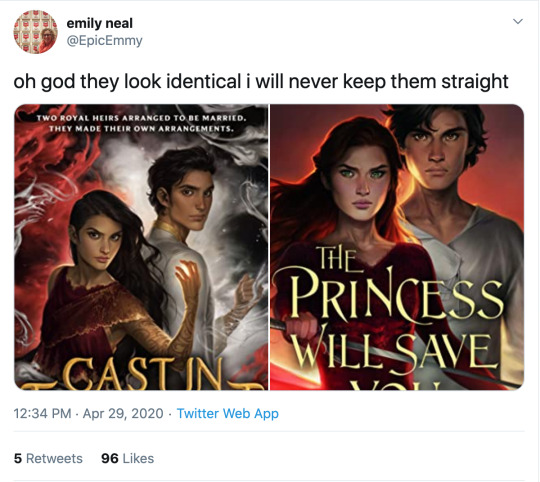
I know I literally just posted that we cannot outlaw book covers from looking like each other, but ! Oof!
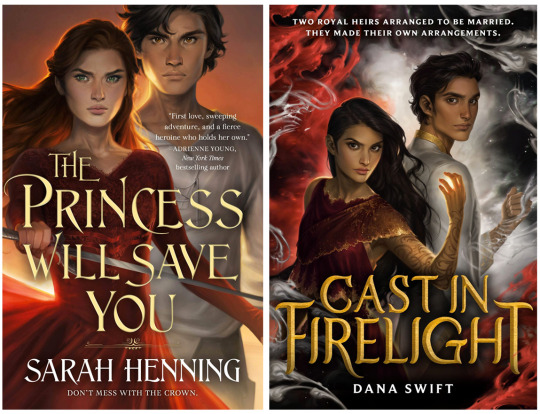
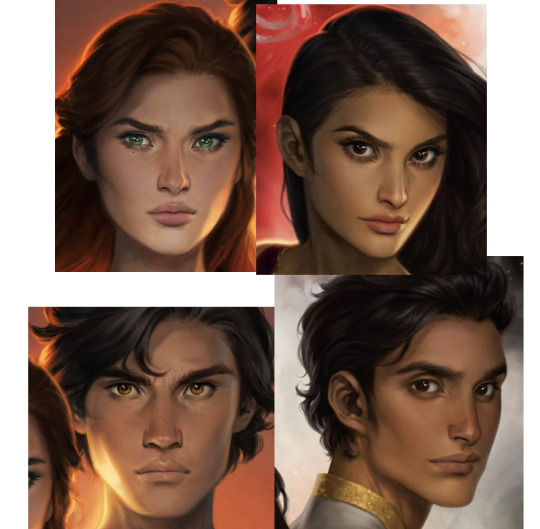
The only thing that softens the blow here is that Charlie has improved at representing nonwhite features such that characters look like POC rather than tan white people, although,, that bar was low. Anybody remember the ACOTAR coloring book.
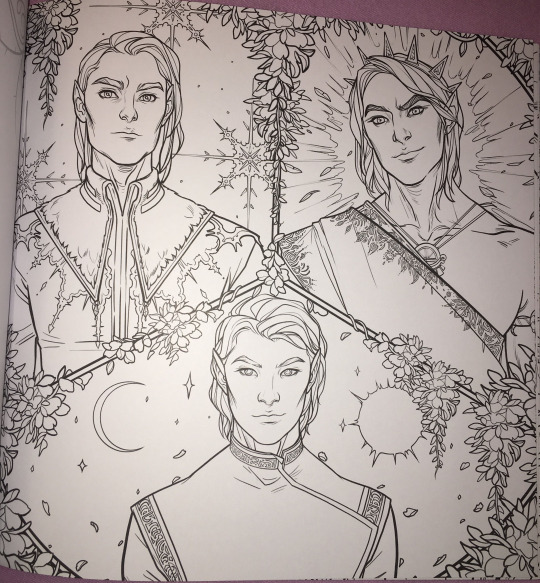
(Would you have guessed that 2/3 of these people are nonwhite? Or even that they’re supposed to be three different men? I guess all the men in Prythian have the same haircut?)
But that minor victory is mostly lost in the quagmires of the fact that Charlie’s style is to give everyone instagram face:
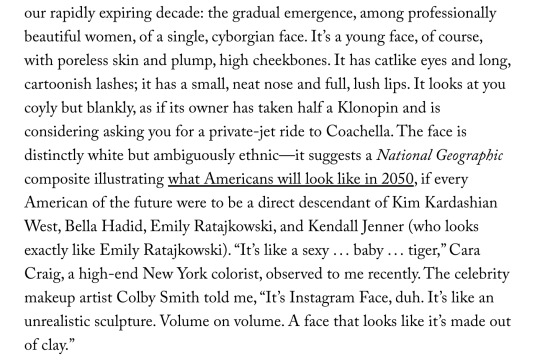
I wouldn’t even call this “Sameface” necessarily: that implies limitation, that an artist is only capable of drawing a single facial structure competently. Bowater is incredibly technically talented, she just chooses to give everyone catlike fae eyes and the cheekbones of a starving nymph. (My previous post on this here.)
But I don’t really blame her for that, or for these hilariously identical, nearly devoid of personality covers. Artists are allowed to do whatever they want. Artists who make art for covers are being art directed by designers and marketing teams who bear responsibility for how the finished pieces turn out.
No, this is our fault, as a community and an industry and..... society, kind of, for valuing character portraits that are “pretty” (“pretty” being an extremely loaded, culturally subjective concept) over art that actually Says Something About The Story. Bowater’s style happens to dovetail perfectly with what we currently collectively find pretty, and so we’ve put her art on a pedestal at the cost of everything else art can or should do for our stories.
And this is understandable: in contemporary western culture, pretty is a value unto itself. Seeing our characters portrayed as pretty denotes them as special, as smart, as powerful. It’s almost impossible to de-program ourselves from that reaction. There are approximately five kajillion studies on how beautiful people are at personal and professional advantages; how they’re perceived to be happier, healthier, more successful, and how those perceptions can translate into realities. (Nevermind how thinness and whiteness enter that equation, see above note about “pretty”.) I would love to see more “average” or weird- looking characters abound (and be accurately visually represented) in the YA/ Genre lit sphere, but for now... everyone is pretty.
Which sometimes means everyone is pretty boring.
But that’s just the specific, "What’s the deal with Bowater’s success in book circles and her style and all the sameiness” part of this equation. What if we backed up and asked: why character art at all? Beyond a question of “pretty”-ness (and general obvious Artistic Quality), why do we gravitate towards it, what's the purpose of it, how does it fall flat in a general sense, and how can it be utilized more effectively?
This is something I think about all the time. I follow writers on social media (because..... I am a writer on social media, regrettably), and we have an enormous collective boner for character art. “Getting fanart [of the characters]” is one of the achievement pinnacles constantly cited when people get or want to get published. Commissioning character art is something we reward ourselves with, or save up for (WHICH IS GOOD AND CORRECT. FREE ART IS GREAT BUT DO NOT SOLICIT IT. PAY YOUR ARTISTS). And like???? Same????? We love our stories because we’re invested in our characters. Most humans, even prose writers, are visual creatures to some extent, and no matter how happy we are with our text-based art, it’s exciting to see our creations exist in that form. So we turn that art into promo material and we advocate for it on our covers-- because it’s so meaningful to us! It goes with the story perfectly!! Look at my dumb beautiful children!!!!!
But on an emotional level, it’s hard to grasp that it only means something to us. Particularly when you take into account the aforementioned vast landscape of beautiful visual blandness of many characters (in the YA/ genre lit sphere, that’s pretty much all I’m ever talking about), character art can be like baby photos. If you know the baby, if that baby is your new niece or your friend’s kid, if you’ve held them and their parent texts you updates when they do cute shit, you’re probably excited to see that baby photo. But unless it’s exceptionally cute, a random stranger’s baby photo isn’t likely to invoke an emotional reaction other than “this is why I don’t get on facebook.”
Seeing art of characters they don’t know might intrigue a reader, but especially if the characters or art are unremarkable-looking, it’s doing a hell of a lot more for the people who already have an emotional attachment to that character than anybody else. And that’s fine. Art for a small, invested audience is incredibly rewarding. But like the parent who cannot see why you don’t think their baby is THE MOST BEAUTIFUL BABY IN THE WORLD???? I think we have trouble divesting our emotional reaction to character art from its actual marketing value, which.... is often pretty minimal. This is my hill to die on #143:
Character portraits, even beautiful ones, are meaningless as a marketing tool without additional context or imagery.
I love character art! I’m not saying it should not exist or that it’s worthless! Even art that appeals to only the one single person who made it has value and the right to exist. And part of this conversation is how important for POC to see themselves on covers, whether illustrations or stock imagery, particularly in YA/kidlit. I’m not saying character portrait covers are “bad”.
I am saying that I have seen dozens and dozens of sets of character art for characters who look interchangeable, and it has never driven me to preorder a book. (Also one character portrait for a high-profile 2019 debut that was clearly just a painting of Amanda Seyfriend. You know the one. There’s nothing wrong with faceclaims but lmfao, girl,,,,)
I’m sure that’s not true for everyone! I am incredibly picky about art. It’s my job. There’s nothing wrong with your card deck of cell-shaded boys of ambiguous age and ethnicity who all have the same button nose and smirk if it Sparks Joy for you.
But if your goal is not only to delight yourself, but to sell books, it’s in your best interest to remember that art, like writing, is a form of communication. The publishing industry runs on pitches: querys, blurbs, proposals, self-promo tweets. What if we applied that logic to our visuals? How can we utilize our character design and art to communicate as much about our stories as possible, in the most enticing way?
Social media has already driven the embrace of this concept in a very general sense. Authors are now supposed to have ~ aesthetics. “Picspams” or graphics, modular collages that function as mini moodboards, are commonplace. But the labor intensity and relative scarcity of character art visible in bookish circles, even on covers, means that application of marketing sensibility to it is less intuitive than throwing together a pinterest board.
Since we were talking about it earlier, WICKED SAINTS, as a case study of a recent “successful” fantasy YA debut, arguably owed a lot of its early social media momentum to fanart.
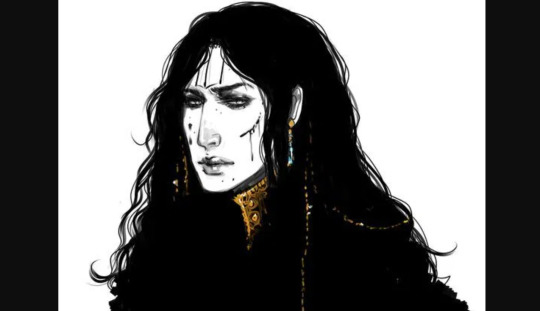
(Early fanart by @warickaart)
The most frequently drawn character, Malachiasz, has long hair, claws, and distinctive face tattoos. WS has a strong aesthetic in general, but those features clearly marked his fanart as him in a way even someone unfamiliar with the book could clearly track across different styles. Different interpretations of his tattoos from different artists even became a point of interest.
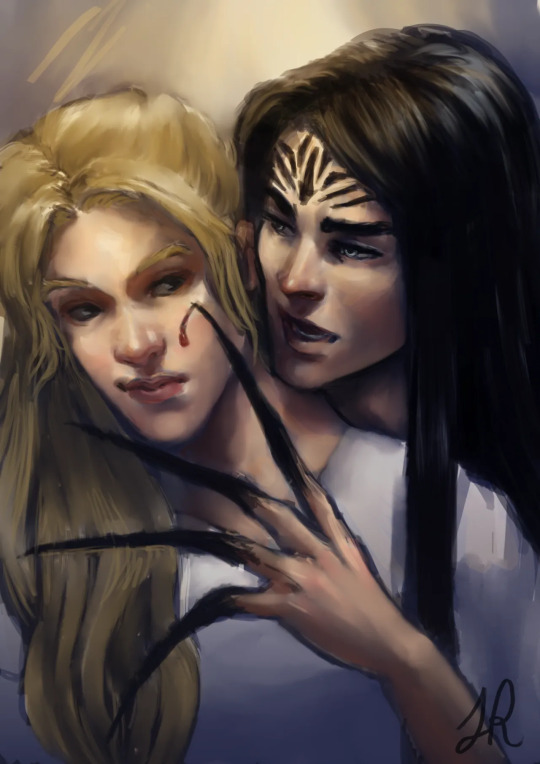
(Art by Jaria Rambaran, also super early days of WS Being A Thing)
Aside from distinctiveness, it's a clear visual representation of his history as a cult member, his monstrous powers, and the story’s dark, medieval tone. The above image is also a great example of character interaction, something missing from straightforward portraits, that communicates a dynamic. Character dynamics draw people into stories: enemies-to-lovers, friends-to-lovers, childhood rivals, platonic life partners, love triangles, devoted siblings, exes who still carry the flame-- there’s a reason we codify these into tropes, and integrate that language and shared knowledge into our marketing. For another example in that vein, I really love this art by @MabyMin, commissioned by Gina Chen:
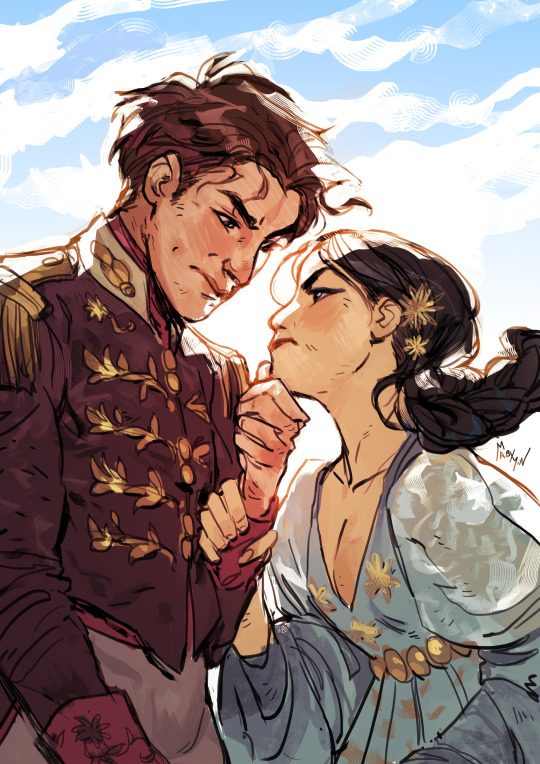
The wrist grip! The fancy outfits! These are two nobles who hate each other and want to bone and I am sold.
In terms of true portraits, the best recent example I can think of is the set @NicoleDeal did for Roshani Chokshi’s GILDED WOLVES (I believe as a preorder incentive of some kind?):
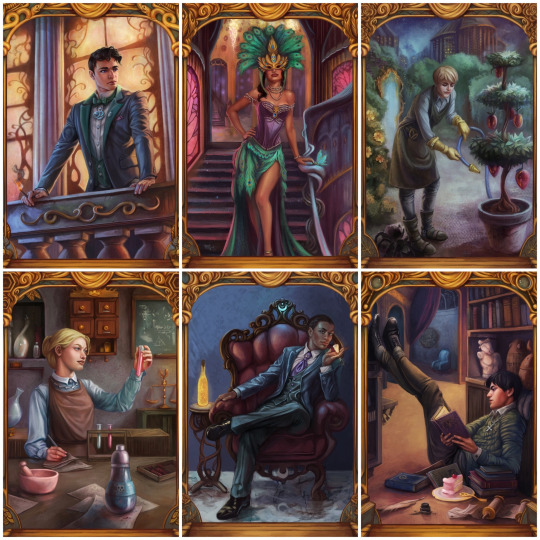
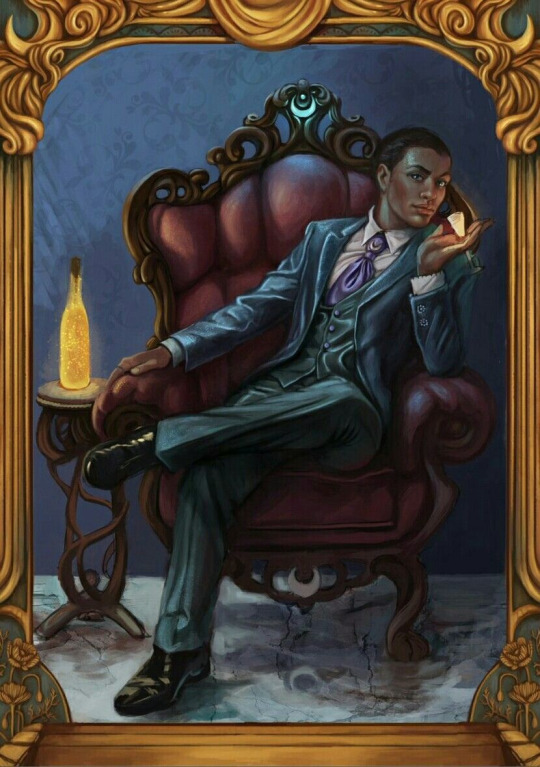
They showcase settings, props, and poses that all communicate the characters’ interests, skills, and personality, as well as the glamorous, elaborate aesthetic of the overall story. Even elements in the gold borders change, alluding to other plot points and symbology.
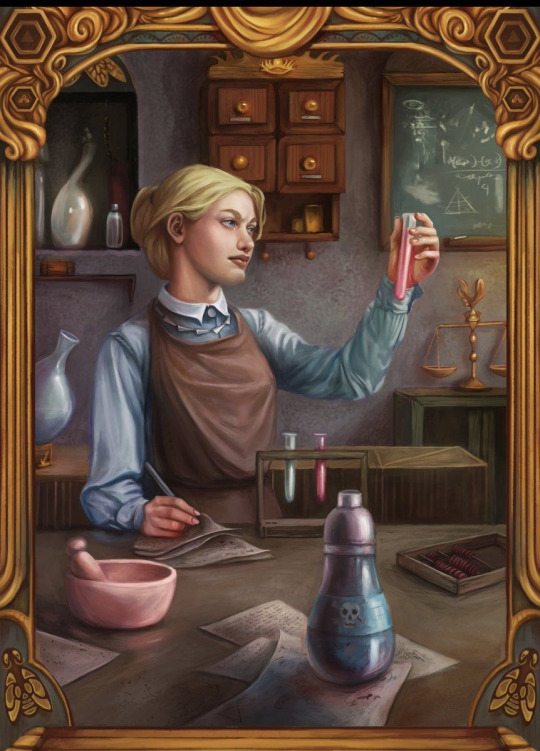
For painterly accuracy in character portraits on covers, I love SPIN THE DAWN. The heroine looks like a beautiful badass, yes, but the thoughtful, detailed rendering of every element, soft textures, and dynamic, fluid composition form a really cohesive, stunning illustration that presents an intriguing collection of story elements.
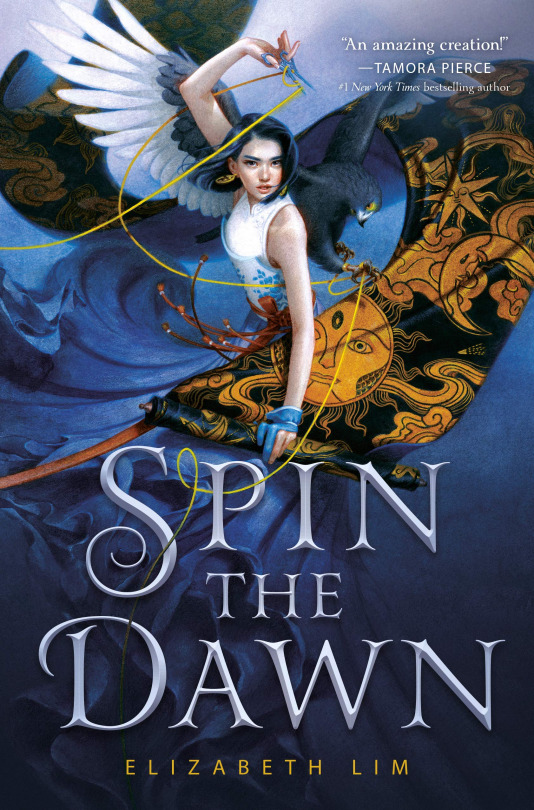
The devil isn’t always in the details, though: stark, moody, highly stylized or graphic art with an emphasis on textural contrast and bold color and shape rather than representational accuracy can communicate a lot (emotionally and tonally) while pretty much foregoing realism.
The new Lunar Chronicles covers are actually the best examples I found of this (Trying to stay within the realm of existing bookish art rather than branch into All Art Of Human Figures Forever):
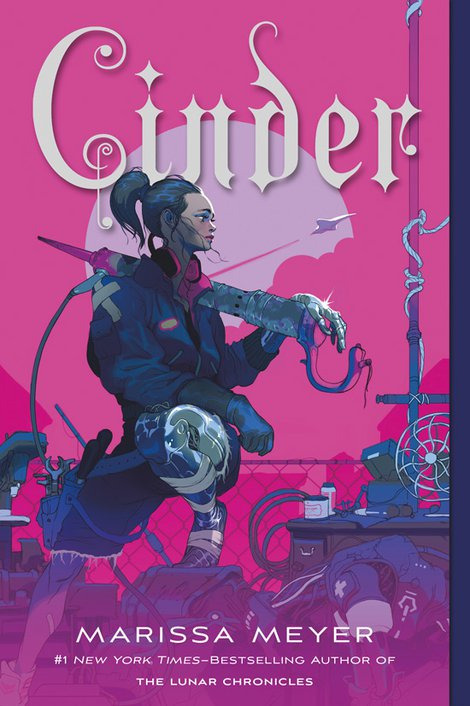
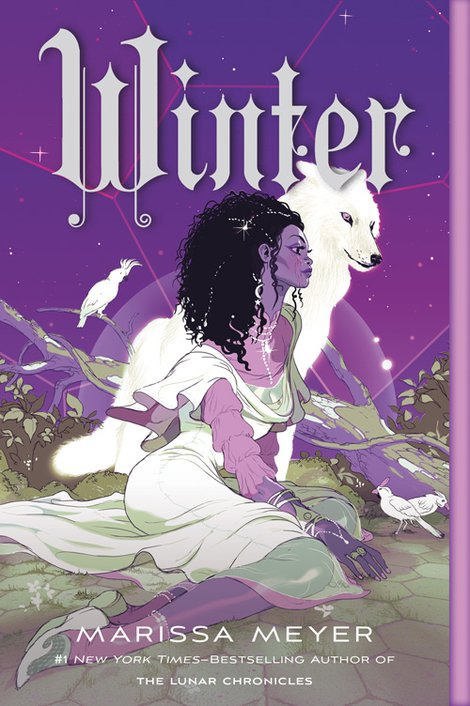
Taking cues from styles more typical of the comics and video game industries. (Games and comics, as visual mediums, are sources of incredible character art and I highly recommend following artists in those industries if you want to See More Cool Art On Your Timeline.)
TL;DR: Character art and design, as a marketing tool (even an incidental one) should be as unique to your story and your characters as possible, and tell us about the story in ways that make us want to read it. I tried to give examples because there are so many ways to do this, and so many different kinds of art, and I could give many more! But I’m bored now. So to circle all the way back:

These are not just bad because they look like each other, although that is embarrassing and illuminating. These are bad covers (although,,,,, PRINCESS is the far worse offender, at least FIRELIGHT suggests a thoughtful cultural analogue) because a desire for Pretty Character Art overrode the basic cover function to tell us about the story. We get no sense of who these people are, what their relationships are, what these books are about beyond the most general genre, or why we might care. The expressions are vague, the characters generic-looking, the compositions uninteresting and the colors failing to be indicative of anything in particular.
They’re somebody else’s baby pictures.
(And yes, that’s the CRUEL PRINCE font on PRINCESS. I better not have to do a roundup post but it’s on thin fucking ice.)
325 notes
·
View notes
Text
The World, My Childhood And My Hero Academia: Vigilantes
Hello friends!
Its Dr. Shojo coming at you with a post that will be divided into three parts!
Part One: The world as we know it!
The world has changed a lot since we last connected. For starters, TOILET BOUND HANAKO KUN HAS NOT ONLY A PHYSICAL RELEASE BUT A GORGEOUS ANIME! And not only that, but MY NEXT LIFE AS A VILLAINESS: ALL ROUTES LEAD TO DOOM! IS GETTING AN ANIME AS WELL! The last time I wrote about Katerina there wasn’t even an official English translation of that long-ass light-novel-title. And now?
A WHOLE ANIME. A BISEXUAL HAREM AWAITS! I am JAZZED!
Do you think it’s my fault? No matter, I’ll take all the credit. All the manga I talk about are getting anime adaptations. I’LL DO MY DUTY AND TALK ABOUT SOME MORE!
But first. Let us address the Covid-19 shaped elephant in the room
I deeply regret that it took a whole-ass pandemic to get me back to writing. In my defense, I bought an iPad and started drawing like 900 kokichi oumas. I was really busy with that. And then I started reading fanfiction. Then that got me thinking about how fanfiction such an interesting look into how people interpret fandom, use it for wish fulfillment and escapism, and good god is everyone OK cause that bulimia fan fic was super detailed....and I am officially on a tangent. Off track. Ahem.
We are all staying inside a whole lot more which means y’all probably need some reading material and Dr. Shojo has your back! Go read “Horimiya”! It’s amazing! Ahhhh, my work here is done! I'm serious, if you’re here for a Shojo rec, that’s it! There's also like 8 million more Otome Isekais to check out now. It’s like they’re multiplying like rabbits..............
As a Doctor, I must advise you to stay inside and read some manga and practice social distancing. Embrace your inner hikikomori.
Allright? All good? Okay now one final disclaimer:
This post is going to be talking about something a little different than usual and I want to start by giving you some context about who Dr. Shojo is in real life.
Part Two: Dr. Shojo Exposed
You see, when I was little I was obsessed with Japanese media. This doesn't surprise you at all I can tell. Probably because I walk around calling myself Dr. Shojo and shout about manga that you should read.
Anyways, the reason why I was obsessed wasn’t because of the big eyes or the spikey hair or the interesting new culture. It was because it tended to have more character development and overarching plotlines than the media I was used to in Canada. Dexter’s Lab, Magic School Bus, pretty much everything I saw on TV was episodic in nature, so imagine how much my mind was blown when I saw Naruto and Card Captor Sakura, heck, even Pokémon had the Indigo Plateau! Here were kids that were learning more and more each day and got to see enemies become friends and vice versa. They lived and grew older just like me. Except they were cooler than me. And had more interesting lives than me. I gotta tell you, I was so sad when I was 12 and Kero didn’t tell me I had latent magical powers. But there was magic in my life and it was the magic of a complex narrative story. And not only that, it had a sense of movement and had cool costumes. I was hooked immediately.
Also, fun fact, at that age I happened to be a complete and utter tomboy! I loved pretending to fight my friends in the playground and was really worried that puberty would ruin my life because being a girl sounded so CUMBERSOME.
Which leads me up to my confession. Before I became Dr. Shojo, I was in fact......Dr. Shonen.
Bleach? Naruto? One Piece? I've read every single chapter there is.
Hundreds of hours of watching fight sequences. Another fun fact, I only got into shojo because my aunt bought me volume 7 and 8 of Fruits Basket thinking “all mangas like the same right? Kids love comics?” It’s a tribute to how episodic western media was back then that she thought buying volume SEVEN and EIGHT was a REASONABLE PLACE TO START READING.
Now you might also say, Hey! Dr Shojo! Cardcaptors was a shojo! And you are right! but back then the anime was marketed to boys over here in the west and they actualy like, edited out episodes that they thought wouldn't interest boys?! Second fun fact, Once when I was in Grade 3 I was told I was not allowed to join a club under the stairs cause I was a girl and it was BOYS ONLY. The point of the club? To talk about how great Cardcaptors was! I Kid you not!
So anyways, your pall Dr. Shojo loves Shonen manga to this day!
The only reason I made this Dr. Shojo blog specifically about shojo is because, being a tomboy with no female friends, reading shojo manga was the first time I really thought about what it meant to be a girl and fall in love. And y i k e s. Shojo manga, like most media, fails miserably most of the time in displaying real world relationships. Or at least, it doesn't prepare you for how disappointing everything can be. When I had my first kiss, I was thinking about how it didn’t feel at all like how I felt reading Zen and Shirayukis kiss in Akagame No Shirayuki Hime. Those were formative years, and shojo was one of the only places I saw romance being talked about for younger audiences. I liked reading romances where no one had any sexual experiences and were figuring out what love meant to them. But let’s shelve this topic for now.
The point is that gender roles are dumb and if you have an open mind there's a world of stories out there for you. Take this time inside to read something you wouldn’t normally. Critically think about the ways that the worlds you see in stories and how you experience the world differ. What are the messages a story is trying to tell you? And why do you like the stories you do? Reflect on how the stories you tell yourself color your view of the world. Even mindless entertainment leaves an impression on us. Anyways.
Whilst you're doing that, I'm going to absolutely lose my hecking mind over the Shonen Jump series MY HERO ACADEMIA: Vigilantes!
WARNING: SPOILERS AHEAD!
Part Three: I downloaded the one month free trial of the Shonen Jump app and made you read all that, so I can tell you that today Dr. Shojo is going to rant about a spin-off of a shonen manga
THAT’S RIGHT, OF COURSE I READ HERO ACA AND YES I DID PICK UP THE SPIN OFF SERIES. SHONEN JUMP LETS YOU READ ALL THE NEW CHAPTERS FOR FREE ON THEIR APP. KIDS, IF YOU LIKE SHONEN AND YOU’RE PIRATING ON A SCANLATION SITE STILL GET OUT BECAUSE YOU DON’T NEED TO SEE THOSE WEIRD PLASTIC SURGERY AND DENTISTRY ADDS ANY MORE.
SHONEN IS HERE AND ITS LEGAL AND ITS FREE FOR YOU. GET OFF MANGA FOX OR MANGA ROCK OR WHATEVER THE KIDS ARE USING THESE DAYS.
OK, so by this point in the article you have learned two very important things about me: 1) I love Shonen manga and 2) I read a lot of fanfiction.
Specifically, I read an absolutely biblical amount of My Hero Academia fan fiction and let me tell you, A solid chunk of it is vigilante/ Deadpool / criminal with a heart of gold themed.
So when I saw Hero Aca had a spin off, and it was about vigilantes, I was NOT SURPRISED IN THE SLIGHTEST. Ao3 sure is powerful.
Now, if you will permit me a tangent in a post full of tangents—HOLY CRAP, THERE ARE TOO MANY VIGILANTE AUS. I CAN'T KEEP TRACK OF EM. IT’S THE ISEKAI PROBLEM ALL OVER AGAIN. I GET AN EMAIL A FIC HAS UPDATED AND I’M LIKE IS THIS THE FIC WHERE DEKU HAS AN ABUSIVE MOM OR THE ONE WHERE HE HAS SPLIT PERSONALITY DISORDER OR THE ONE WHERE HE’S VIGILANTES WITH HITOSHI. OH WAIT, nvm, it’s the one where deku has a healing quirk.
OH WAIT WHICH OF THE 6 DEKU WITH HEALING QUIRK VIGILATE AU FICS IS THIS ONE?! ARGH WHY DIDN’T I WRITE A DESCRIPTION IN THE BOOKMARK FOR THIS!
My gripes aside, there's a reason why there's such an abundance of vigilante story telling—
Deadpool made like an absolute buttload of money and people love sass and memes.
People have a desire for a story in which they see themselves. Or, how they think of themselves.They like a story about someone who maybe came from nothing. Someone who has less money, maybe someone who is unlucky and had some bad breaks. Someone who never learned they had magic, never got their Hogwarts letter, never saw Kero, someone who never got that God-level quirk from All Might. And if your on Ao3 They want someone who also has seen a lot of memes and kind of wants taco bell and is also questioning their sexuality a bit?
Enter our new hero VIGILANTE DEKU.
But the cannon can't do this, cause hey, Deku is the chosen one. Albeit, chosen by All Might, He’s got his own thing to do. But how can we still cash in on a vigilante story?
And thus enter our New-New hero KOICHI HAIMAWARI—code name Nice Guy and then later The Crawler. True to his relatable roots. He’s just a dude in an hoodie who can go about as fast as a bike.

First off, I love Koichi. He wants to be a hero and fight crime, but most of the time he has to run away because at the end of the day he's just a dude.
He’s cute but not wildly good-looking, A bit of a nerd but not like an extreme okaku. He’s got a part time job and hates violence.
And this is where Koichi really shines—in every day stuff. He helps out wherever he can. Often, that just means listening to people complain and maybe helping his friends out with whatever they’re going through. He’s the kind of guy who smiles, not because he's especially brave, but because he just takes things one at a time and doesn't sweat the past. I think it’s really telling that he missed getting into hero high-school because he skipped the entrance exam to help someone. He’s the kind of person who lets us experience the superpower of human decency and empathy. And you know what? That’s something the world need desperately.
This theme of human decency is really the driving force of Vigilantes—it’s a manga about how the laws are there for a reason but sometimes they unfairly impact the poor and vulnerable. It's about how a lot of criminals are just people who fell into bad social circles or on bad times. People have the capacity for cruelty and violence but that’s never all they are.
Now, speaking of crime, the entirety of Hero Aca falls into some murky water when it comes to its evil doers. Much of the fandom has a huuuuuge problem with how much the franchise is willing to sweep under the rug in the name of redeeming their baddies. RE: people getting mad about forgiving Endeavor’s child abuse, or Bakugo’s suicide baiting. Or Mineta’s blatant sexual harassment.
But this theme is in Vigilantes even more than it ever was in the main series. To start off with, there’s this guy who tries to rape Pop Step early on, and the later he later winds up befriending everybody. It becomes a running gag that each new villain winds up befriending the other villain guys and then they all open a cat café together.
Using jobs as a way to lift people out of lives of crime is great and all but in the story there is no nuance or consequences for past wrong and well.....it feels very weird. It's like Vigilantes plays at having an opinion about moral ambiguity and the complexity of human existence and then just.......lets everyone get along because who has time to get into all that. Make of that what you will but it sits weird for me personally.
Anyway, let's move on and talk about POP STEP our main girl!

I love pop stars and I love vigilantes and a guerrilla performer is defiantly a character I could get behind. And I think they do a good job with Pop. She is actually kind of shy, but has this secret edgy persona she puts on when she performs. She is every girl on tumbler in the early 2000s. I also looooove that they make her not that great a singer. SHE’S GOT PASSION AND CHARISMA and maybe not born talent but like why should that stop you! Talent can be earned through practice and this is a great lesson to show people.
Unfortunately, Pop is also a great example of everything wrong with romance in Shonen.
It’s established early on that Pop loves Koichi because she is the girl he rescued all those years ago and yada yada yikes we’ve heard this one before. Many times before.
Sure, it's fine that they’ve met before, but gosh am I sick of damsels in distress. It's like she can't love him just because she respects what a great guy he is in her life and in the community at large, no no, she just needs to be rescued on top of that. And LOLOLOL isn't it funny he never noticed she was a girl because she was a child with short hair?! Once he realizes she has boobs now they will for sure fall in love! That’s how love works!
She's just with him all the time—nothing romantic ever happens she just gets a little tsundere.
I am never ever going to believe Koichi likes Pop because he spends like sooooo much time with her and they never have like, a moment. The first time he considers her is when Makoto is like, ‘hey I would love to get together with you, but have you thought about if you are crushing on Pop’. (Also this entire plot point is suspect—she's arbitrarily falling for Koichi cause he.......is the protagonist?)
Say what you will about shojo, they give you the emotional conversations, the moments where you think.....ahhh I can see why she is falling for him. They give you context! Shonen likes to just say HERE’S A GIRL YOUR AGE. YOU CAN DATE LATER WHEN THE ADVENTURE IS DONE.
Just when they might get together, Pop suddenly turns evilllllll. The evilllll beeeees made her eeeevilllll (and more sexy).
*Siiiiiiiiiiiiiiiiighhhhhhhhhhhhhhhhhhhhhhhhhhhhh*
Because why on earth would they get together if Koichi didn’t get to rescue Pop one more time?
I’m tired. These troupes are tired. I’m sure you are too. HOWEVER! If your still with me, Let’s move into why I'm really writing this post. Let’s get to the part that got me screaming to my friends, who by the way, don’t even care bout Hero Aca….but listened anyways. May you all find nakama like these my friends.
Anyways,
HOLY FUCK ERASERHEAD’S ENTIRE BACK STORY IS IN THIS AROUND CHAPTER 60 AND IT IS WONDERFUL AND ABSOLUTLY HEARTBREAKING AND IS ONE OF THE BEST CHARACTER BACKSTORIES I HAVE EVER SEEN AND IS THE REASON WHY THIS SERIES IS A MUST-READ FOR MAIN SERIES FANS.
AND BY ALMIGHT.
WHY. IS. IT HERE.
I present to you my late night text messages to my friends
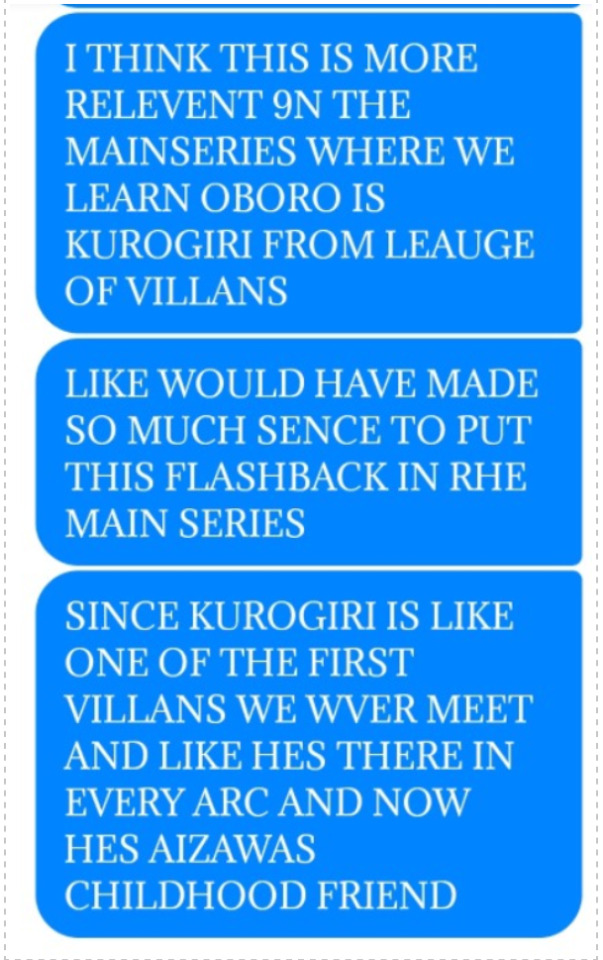

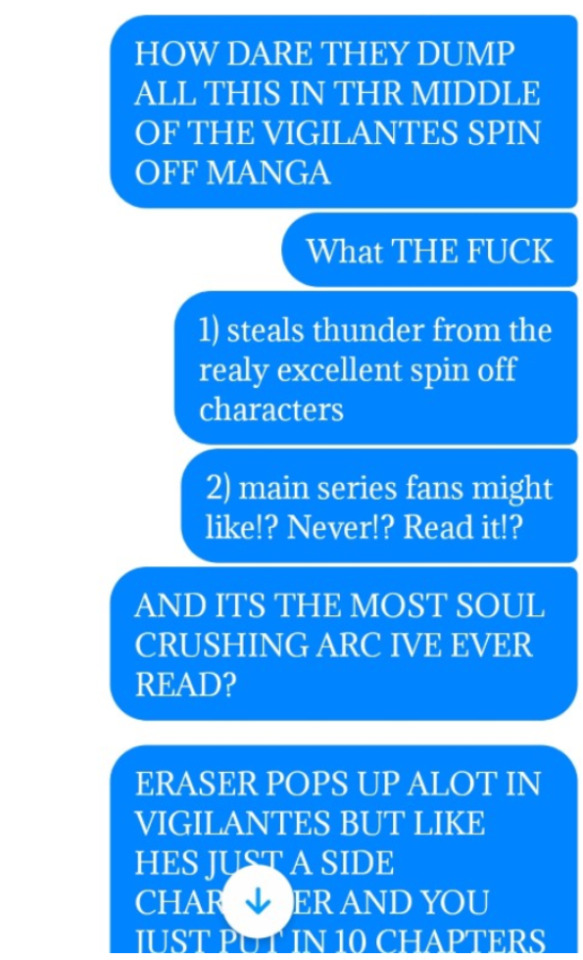
ALSO, AIZAWAS TEACHER IS PRINCE?!?!?!

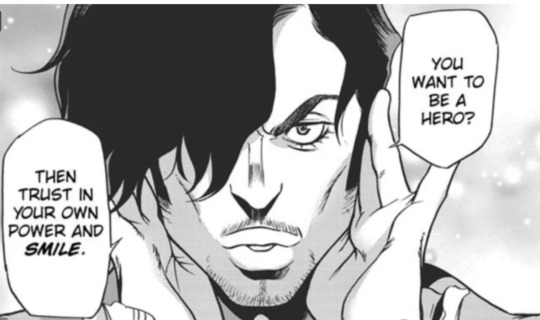
AHEM, so as you can see, I kinda lost my shit.
And now, I would like to formally defend my claim that DESPITE HOW AMAZING IT WAS, ERASERHEAD’S BACKSTORY HAD NO BUISSNESS BEING IN THE VIGILANTES SPIN-OFF MANGA.
Eraserhead, aka Aizawa Shouta, is a side character who is working with the police on some crime stuff. He is not a main cast member in this spin off. He’s a guest character that fans of the main series will be like OH COOL. GRUMPY CAT MAN LIKES CATS ON HIS OFF HOURS TOO. LOVE THAT FOR HIM.
So, my imagine my absolute surprise when Aizawa runs into Koichi and the following happens:
It starts to rain, so, like in any good manga, this means some great FORCED BONDING TIME
Except no. It doesn't because rather than start talking, Aizawa JUST STARTS REMEMBERING—ABSOLUTLY SILENTLY TO HIS OWN PRIVETE SELF—HIS ENTIRE TRAGIC BACKSTORY.
AND THIS GOES ON FOR CHAPTERS.
THIS GOES ON LONGER THEN ARC ONE IT FEELS LIKE.
I LOVE IT, BUT KOICHI IS ABOUT TO JOIN ATSUSHI NAKAJIMA IN THE DUBIOUS CATEGORY OF “PROTAGONISTS THE SERIES FORGOT ABOUT IN LIEU OF COOLER SIDE CHARACTERS”.
AND LO IT HAS NO BEARING ON THE REST OF THE PLOT, CHARACTERS, OR STORY
What the ever-loving-just WHY?
WHY?
WHYYYYYYYYYYYYYYYYYYYYYYYYYYYYYYYYYYYYYYYYYYYYYYYYYYYYYYYYYYYYYYYYYYYYYYYYYY?
SURE, IT’S A COOL TIE-IN.
YES, OF COURSE I LOVED IT. I SHIP ERASER MIC, I DREW THIS FOR HECK’S SAKE:
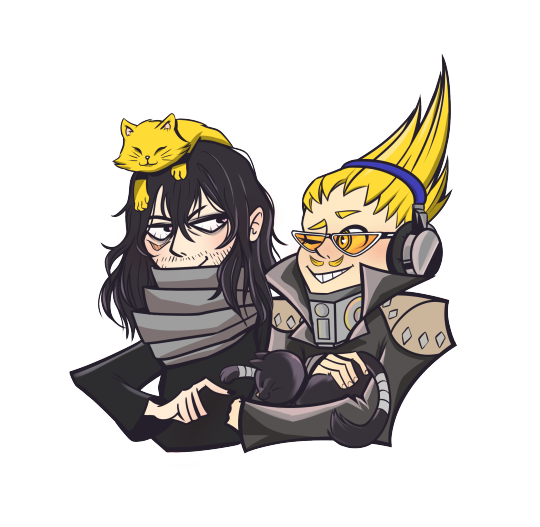
AND YET I AM ANGRY.
I AM ANGRY BECAUSE MY FRIDAY WAS RUINED BECAUSE VIGILATES SUCKER PUNCHED ME WITH AN AMAZING STORY THAT REALLY WASN’T PLOT RELEVANT AND PROBABLY SHOULDN’T HAVE BEEN THERE.
IS THIS WHY THEY TOOK LIKE NEXT-TO-NO CARE WITH POPS ARC?!?
I mean its ongoing, so it’s too early to say but—
In conclusion—
Excuse me one more,
AIZAWA WAS TAUGHT BY PRINCE!?!??!?!?!?!? PURPLE RAIN PRINCE!?!??!?!?!? WHAT!??!?!?!
It’s so ABSURD that I HAD TO WRITE SOMETHING ABOUT IT. I HAD TO WRITE PARAGRAPHS TO JUSTIFY YELLING ABOUT THIS ONE THING. WHAT THE ABSOLUTE—
Ahem,
Anyways, I hope you liked this weird rant/personal-story/random-diatribe in three parts.
If you’re reading this, thank you, stay safe, and I’ll be back with more shojo manga next time.
Ciao!
Dr. Shojo
(aka Dr. Shonen)
#my hero academia vigilantes#koichi haimawari#pop step#my hero academia#erasermic#Cardcaptors#Shojo manga#Shonen Manga#Dr Shojo#read Horimiya
76 notes
·
View notes
Text
Cops & Robbers, Left & Right
One of the most important attitudes that dominates our, American, and almost all Western discourse is how the left is held to a higher standard of behavior. I certainly do it.
Harassment, epistemological ignorance, take your pick: if someone on the right does it it gets a shrug, but if someone on the left does it’s a dire concern for our principles. Donald Trump can insult every group in the country all day long, but Hillary Clinton calls half of her opponents “deplorable” and it gets pretty much equal coverage and outrage. Who even notices if a Walmart manager sexually harassed their staff -- but a producer at NPR, oh my.
Now this isn’t to say “everyone hates the left.” Obviously there are still many partisans who will defend social justice or communism against any attacks, cherry picking right wing examples to make themselves look bad. But I guess that’s just it: they’re being mindless and just ignoring inconvenient data. Anyone who engages in actual discussion, and holds both sides to any accountability at all, holds the left to much higher standards.
And yes, for this discussion I am going to state the overall assumption up front: viewed in aggregate, the left’s behavior in this century (culturally or politically) is nowhere near as bad as the right’s. There is no statement by any politician, activist, or star on the left that you can not find something worse by an equivalent or higher-profile person on the right. We have Anita Sarkesian, you have Rush Limbaugh. We have Bernie Sanders, you have Rick Santorum. HRC vs DJT.
This isn’t to say the double standard is bad. I definitely hold the left to a higher standard. Some right-twitters use bad logic and statistics, I’ll laugh before blocking them. Some left-twitters use a bad statistical framework for looking at gun violence/pay gap discrimination, and I won’t stop fuming until I’ve composed a six page tumblr essay. But why do I do it?
The imbalance is so widespread that there are many explanations for it, but they fall short to me.
1. The left are our people. This essay about internecine harassment falls in that camp https://www.thestranger.com/slog/2019/01/08/37793831/think-online-head-from-your-enemies-is-bad-try-getting-it-from-your-friends
I’ve taken heat from both sides, and while hate mail and mean tweets from my ideological opponents are annoying, they’re also easy to dismiss. I criticize Trump, someone with a giant red X in their Twitter bio calls me a cunt, and I glance at it and move on. It’s like a fly buzzing around your head—you swat it away and soon forget its existence. But when I criticize my own side—for being, at times, intolerant and dogmatic—the mob is made up of people I agree with on the big issues (climate change exists, health care is a human right, Trump is a fool and a danger) but disagree with on some small specifics. In this case, the buzzing doesn’t just annoy; it actually stings. (Or, at least, it used to. Turns out, you can become inured to almost anything.)
Slatestarcodex describes it as our disagreement with the fargroup (who we barely know) being eclipsed by the imminence of the neargroup (who are threatening us right next door.)
Except no. People native to the right happily share this double standard. And when people leave left-wing circles, driven out by how much they see their allies fail to live up to their ideals, and fall into orthogonal or centrist movements (say, rationalism) or right wing movements (hello alt), as often as not *they still focus on the failings of the left*. The reaction as someone changes environments varies, and indeed sometimes ideological emigres are just as upset at their new allies… but the flaming, biased hatred towards the left stays alive often enough for me not to buy “it’s because these are the people who are around us.”
(This also goes for the inverse explanation: that we critique the left more because we are more likely to be able to influence it. Plenty of dissidents aren’t!)
2. The left holds the real power. In this explanation, the cultural and social power that the left holds, especially over professional matters, dwarfs the economic and political power the right often holds. Or local government (if you’re in a city) is terrifying compared to national government. Or the “Deep State” which is a bunch of left-friendly bureaucrats holds the real power, and not the conservative politicians holding nominal office. (One might even call them “the Cathedral.”) And since they actually hold power, we should be more critical of them.
As an explanation of convenience, this can be made to fit any situation. Power is amorphous and very hard to pin down. In any particular situation you can make up a story about why you are right to fear left-derived power than right-derived power.
But I can’t see any theory of power where it makes broad sense. Like how can you sit down, and tally up all the forces in America - voters, colleges, state governments, corporations, small employers - and come to the conclusion that progressives have the overwhelming advantage? Certainly how could you tally up all the DAMAGE wrought by various forces, and think there’s more danger from the left? These people are always conspicuously silent on the current goddamn President, or the largest employers in the nation, or the military culture.
3. Equal criticism to both sides will have to target the left unfairly. I mentioned Hillary Clinton and Donald Trump before, and there’s a cynical explanation that “well the news media is going to want to attack both to seem unbiased, and that’s going to mean pitting the worst scandals of each against each other, even if one is in absolute terms much, much worse.” There’s something to this - but outside political races, the different powers are so asymmetric that I don’t think that really resembles anyone’s thinking process. What would such a Thoth be balancing for? Colleges vs corporations? Intellectuals vs service members? Bosses vs workers? Urban vs rural? I don’t see anyone in the discourse really trying to apportion fault between wildly different groups like that equally.
***
The closest to an answer I’ve come you can tell from the title. It’s a mix of all three above explanations, but with a strong moral intuition that *the left should be the good guys* (whether you are right or left yourself.)
The feelings most discoursers have about the left and right, is like feelings we have about police and criminals.
Criminals kill and hurt more people than the police, easily. And yet, we talk about the conduct of police much more. Why?
Well, for one, supposedly the police work for us, and so should be taking feedback from the citizenry, whereas no one expects that of criminals, so moralizing about them is wasted breath. And that’s true to an extent, but this sort of anger is shared by radicals and activists who hold as very deep parts of their sociology that the police are a power unto themselves and answerable to no one, especially their victims.
And different people react to this police anger differently. It would be very dumb indeed to think the police are so bad that it would be better if the criminals were put in charge of the police force - but some people get angry enough that they do think that way. Much the same as some liberals, well:

Not everyone reacts the same way of course. Some people criticize the left all day, but still reliably always vote for left over right. Whereas some people are so swayed by their critical emotions, that they buy in that the right must actually be preferable.
But underlying either response is just “these are the good guys!” We can’t ever separate our reaction to someone on the left from “I really expect better from you.” It’s not just about nearness to them, or the cultural power they wield, but an unconscious moral assumption about the world. And if the cops aren’t going to be better, why even have them at all?
And that intuition can mean a lot. For one, it’s a lot harder to fight back against the good guys. When you fight back against progressives or cops, people who don’t know you well think you’re a villain. It’s an uphill demoralizing battle - much worse than complaining about how a conservative state legislature fired you or how a racist troll harassed you. And so some people want to stake out as hard as they can beforehand “these aren’t actually the good guys.” With, alas, mixed success.
33 notes
·
View notes
Text
Western social media has no respect for Japanese online artists - and it’s killing online art
The visual arts have evolved to suit the most popular medium of each era. In nowadays’ case, the internet is the go-to method of sharing the fruits of one’s labour). However, as stated in that tweet thread of mine you can see if you scroll down a bit (assuming you’re viewing this post on chariot313.tumblr.com) different cultures have different attitudes towards how their customers react to their products. This include you know what fuck the formalities, I’ll just say it: The exclusively western concept of someone seeing something they like online and hitting the share button to stimulate the “Haha, upvotes go ‘brrr’!” dopamine in their smooth-ass lizard brain will be the death of online Japanese artists. Or rather, it has been already, and you would know that if you’ve ever seen an artist’s Twitter bio be in mostly Japanese save for one sentence in English; “Reprint is prohibited.”.
If you want to hear me rationalize the absurd claim I just made, feel free to click the “Keep reading” button. Otherwise, turn back now and save yourself from me possibly wasting your time.
Alright, you’ve chosen to stick with me. Just remember, you asked for this.
Introduction
Social media as a whole is based around sharing (posting, uploading, submitting, tweeting, blogging, streaming etc.) and other’s reactions to what one has shared (views, likes, subscribers, favorites, followers, upvotes, retweets, reblogs, crossposts, etc.).
However, miscommunication and culture shock due to language barriers and cultural differences is one of the many factors that can negatively affect one’s experience on social media. For example, the Japanese artist community, active on sites such as Twitter, Pixiv, NicoNico Seiga, FC2 blogs, etc.. Twitter is mostly inhabited by English-speaking users. Here in the west, our main motive for sharing something on social media (such as art) is for fame and recognition. However, over in the East, most online artists only upload their works to the internet for personal use. I’m not saying one cultural attitude towards sharing art is better than one another, but when these two worldviews collide, the culture shock can negatively affect the careers of artists who are unaware of the other culture’s differing views on sharing art.
So, I’ve listed numerous social media platforms below and I’m going to elaborate on how each of them contributes to the alienation and discouragement of Japanese artists.
DO NOT WITCH-HUNT OR HARASS THE CULPRITS I’VE LISTED AS EXAMPLES; THEY ONLY SERVE TO BACK UP MY ARGUMENT
Twitter
Go into the twitter search bar and type in the name of an anime character (usually female). What do you find? Most likely an account named after said character that does nothing but post unsourced fan art of said character with cheesy “in-character” captions on them.
Exhibit A [NSFW]
Exhibit B [NSFW]
Exhibit C [very NSFW]
Aside from that, Twitter isn’t that bad in this regard, as a lot of the art that gets stolen is originally uploaded to Twitter anyway. But I’m just getting started.
Wattpad
Ah yes, Wattpad. One of the “trinity” of fan fiction communities (the others being fanfiction.net and AO³), featuring many different stories with varying degrees of readability. The problem is the option to add a picture to adorn your fanfiction, at which point most of the authors google “<fanfic subject> fan art” and use something from there without considering the repercussions. This causes Wattpad to be one of the top results when reverse image searching to find the source of some fan art, aside from another site I’ll mention later on...
Reddit
There’s a subreddit I often browse called r/ChurchOfJirou, a community for sharing anything relating to the character Kyouka from My Hero Academia (I mean come on, she’s like the cutest thing ever). A lot of the posts on that sub are sharing fan art of the aforementioned character. One of the rules in the sidebar is “always include the source in the title or the comments”. And most of the submissions make good on that rule. However, a lot of the posts are from Japanese artists on Twitter or Pixiv, and following the source link leads you to find the artist’s bio, which usually has something along the lines of “don’t repost my work”. And what’s more, the biggest offenders (of submitting art to the sub without OP’s permission) were the moderators of the subreddit. You know, the ones who are supposed to be enforcing the rules? I even got so fed up that I called it out, to which one of the mods replied,
“It doesn’t really make a difference, does it?”
Luckily, not all subreddits are like this. For example, other MHA-related subs like r/BokuNoShipAcademia or r/ChurchOfMinaAshido have moderators that are more considerate of artists’ wishes. Overall, Reddit is usually a hit-or-miss when it comes to this kind of thing. At best, you’ve got subs like the two I just mentioned which make sure to respect artists, and at worst you’ve got people trying (and failing) to edit out watermarks. Also, not to self-promote, but this tweet of mine represents this situation pretty well:
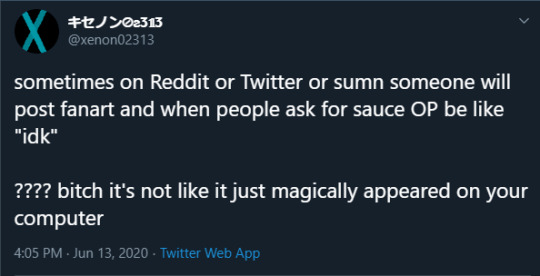
Imgur
Imgur isn’t that bad compared to the rest of these, but it’s a common one that people link to when asked for the source of whatever they’ve shared on Twitter or Reddit or whatever.
Amino Apps
Amino Apps is a strange case. I don’t know much about it since I’ve never used it, but from what I do know it seems similar to Reddit in that there are numerous communities for different niches. That said, judging from the way it clogs up Google image search results, I doubt OC art is posted there often.
YouTube
Now, you may be thinking, “How does a video site rip off others’ art?”. The answer is uploads of soundtracks. Look for any OST from a video game or anime on YouTube and the picture used for the video will likely be some fan art by a Japanese Pixiv artist, usually one that forbids reposts of their work. Not only that, but if the uploader did bother to add the source in the description, it’s usually not even a link to the actual source, more likely a link to Zerochan or Pinterest or something. Now take into account that some of these videos get millions of views. Imagine working hard on something, and some numbnuts takes it, slaps some music onto it, uploads it to YouTube, and gets millions of views while you get next to nothing in comparison.
Exhibit A
Exhibit B (re-upload; original had nearly 40 million views before it was copyright claimed)
Exhibit C
and many many others
Pinterest
Alright, this is the big one. When Pinterest isn’t giving recipes or wardrobe ideas to suburban white moms, it’s clogging up Google reverse image search, punishing anyone who just wanted to find the source of some cute fan art. I feel like this meme by ZebitasMartinexSi on Facebook sums it up:

For example, this piece of Legend of Zelda art by Twitter artist @_nomeri_ (I’ll just link to it, since it would be hypocritical of me to embed the image even though @_nomeri_’s bio warns people not to repost their art). Good art, right? Well, if you right-click and hit “Search Google for image”...

...yeah. Pinterest is a plague. It thrives on theft. Even worse is when someone will post fan art on Twitter/Tumblr/Reddit/etc. and have the nerve to say “IDK the source I found it on Pinterest ^_^”. Or worse yet, they link to Pinterest saying it’s the source.
Instagram
While many other sites rag on Instagram for its reposting of memes, it’s no better when it comes to reposting fan art, especially from Pixiv. I’ve seen lots of stolen pieces with fan fictions written in the description. Personally, if I were an artist, I’d rethink my career choice if I saw my art reposted on Instagram with a half-assed fanfic under it, so I don’t blame Japanese artists who close their Pixiv accounts after seeing that. But that doesn’t mean we shouldn’t try to prevent it from happening in the first place.
DeviantArt
DeviantArt is more “renowned” across the web for its niche circles of bizarre fetish art, but in its defence, there are some legitimately good pieces on there. If you do find a good one though, try checking to see if all of the uploader’s pieces have a similar overall art style, because if not, that’s a sure sign of someone passing off some Pixiv user’s art as their own, which is unfortunately fairly common on DeviantArt.
9Gag
Not a whole lot to say about 9Gag. I mean, it does contribute to reposting of art, but nothing really separates it from the others on this list, aside from its watermarks. At least the watermark gives away the fact that something was reposted.
Know Your Meme
You know that Zelda pic by @_nomeri_ I was talking about earlier? Well, to add insult to injury, it became an object-labelling meme.

Imagine putting hours into something and politely asking others not to repost it, only to find that some nincompoops on r/DankMemes made it into an object-labelling meme.
But this isn’t KYM’s fault, per se. Know Your Meme only documents memes; they do not create them. However, as someone who regularly browses the Know Your Meme image galleries, I can say that the image gallery has essentially become Know Your Fan Art (unlawfully reposted fan art, that is).
Redbubble
There’s an NSFW artist I follow on Twitter by the name of Nico-Mo. A while ago, his Pixiv account was suspended, and there were numerous pictures on there that he had not uploaded to his Twitter or DeviantArt, so I found a mirror of one of those pieces on Gelbooru and reverse-image searched in hopes of finding it on his Twitter. No such luck. What came up instead was a .png of the piece made into a sticker being sold on Redbubble. In fact, that’s one of the major reasons why artists disapprove of their art being reposted, as it may find its way onto a sticker or a T-shirt being sold as merch without the original artist giving consent nor the artist receiving so much as a single nickel.
Facebook
Surprisingly, I think Facebook is one of the least offending sites on this list. Still worth mentioning, though.
Funnyjunk
Like Imgur, Funnyjunk isn’t that bad compared to some of the rest of these, but this exchange in the comments of a repost of an MHA artist that deleted their account (not hard to see why considering people straight-up ignored the big-ass watermark at the bottom) is proof enough of western social media’s flippant attitude towards ruining online artists’ careers.
Aggregator imageboards such as Yande.re, Konachan, Danbooru, Gelbooru, Rule34, SankakuComplex, Zerochan, etc.
I don’t think I need to explain these. But like Imgur, these are what most people link to when asked for source instead of bothering to find the original post.
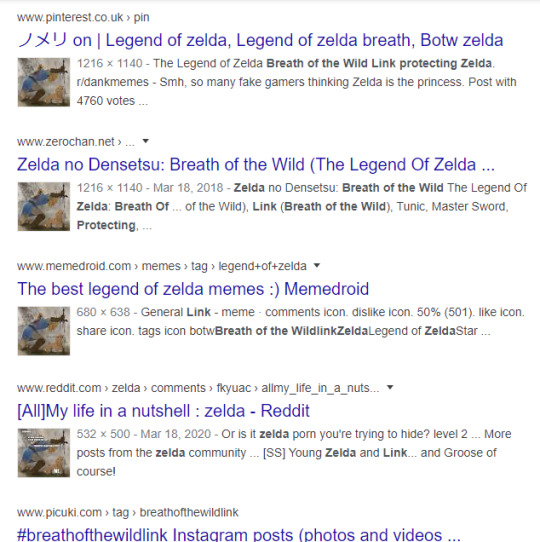
We Heart It
I don’t know much about “We Heart It”, but it seems to be a “Pinterest Lite” considering it clogs up image search almost as much as Pinterest does.
iFunny
Basically the same as 9Gag, in the sense that its watermarks are a dead giveaway.

4chan
I’m not sure if 4chan really “counts” among these, as it’s a chat board where nearly everything is impermanent anyway. However, I was once on an NSFW subreddit where one submitter used a 4chan thread to get Patreon-exclusive material from an artist to upload to the sub (even though one of the rules of the sub was “no paywall content”), so that alone earns 4chan its spot on this list.
Tumblr
Yes, not even Tumblr is innocent. Although I’m sure you knew that. Similar to what I said about Twitter, look up any blog named after a fictional character and it’ll likely be chock-full of unsourced fan art.
“Why is this even important?”
Because if an artist sees that their work is being reposted, depending on the artist, they may delete the original post when they wouldn’t have to if people had just respected their wishes. Now, if an artist wants their works gone from the internet for other personal reasons, that’s up to them and we should respect them for it. But artists taking down their works due to mass reposting is 100% preventable, which is why it’s sad. If you don’t respect an artist, they won’t create art. Simple as that.
“Why do you care so much?”
Eh, I’m just weird like that. It just ticks me off when anything online, whether it be art, or a video, or whatever, is lost. In my opinion, nothing hurts more than clicking a Pixiv link on an imageboard and being greeted with “The work was deleted or the ID does not exist.”.

“But lots of western artists forbid reposting of their art too!”
Indeed, that is correct. But while many artists of every nationality and culture frown upon reproduction of their work, it seems only western social media is responsible for reposting art in the first place. I mean, why else do you think Japanese artists are saying “Reprint is prohibited” in English when the rest of their bio is in Japanese? Because English-speakers are the ones reposting.
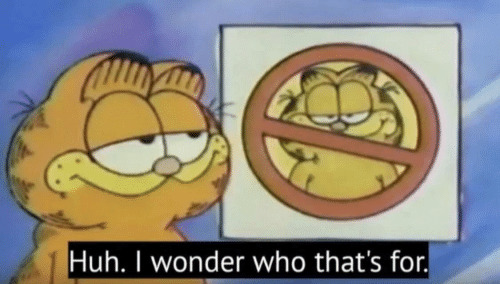
“But exposure can help an artist!”
Yeah, that’s true...
...but “exposure” doesn’t mean much if those “exposed” to one’s work don’t know or care who it came from.
And if you need even more reasons, look no further than these posts about the same topic by other blogs:
https://cranberrywitch.tumblr.com/post/143456002228/stop-reposting-art-from-japanese-artists
https://thegospelofnagisa.tumblr.com/post/143308182398
https://edendaphne.tumblr.com/post/163117317030/ive-been-wanting-to-make-this-educational-cheat
https://marklightgreatsword.tumblr.com/post/190056977650/discourage-art-theft-in-fandom-in-2020-dont
https://letusrespectpixivartistconsent.tumblr.com/post/92189994896/why-is-this-important
also, not to self-promote but I made a thread on Twitter on this topic about a month ago that you can check out here.
That’s all.
posted Jun 14; last edit Jun 21
#art theft#pinterest#rant#essay...?#soapbox#pixiv#twitter#tumblr#respect artists#deviantart#instagram#weheartit#aminoapps#know your meme#reddit#western#japanese#art#artists#imageboards
1 note
·
View note
Text
The end.
week 13: Jay David Bolter and Richard Grusin, “Remediation”
Maghada Kingdom, Northern India. Somewhere around 2500 years ago:

I feel you Sha’
All beautiful things must end, and so also my smart-ass blogposts have to.
SAD
But I don’t know maybe you can pool some kind of financial resources and grant me a salary to write you reviews on stuff. It’d be cool, and I’d be constantly on strike to try and negotiate a better wage because

But anyways.
Before we start this last ride about digital media, I have a kind message addressed to my dear friends Bolter & Grusin

No for real guys. Don’t get me wrong here, your paper is great and you sound like chill dudes, but
DUDE
your points are SIMPLE, and we’re all grown ups with an education. You DO NOT have to state and re-state the obvious and make multiple and equally obvious examples
LIKE, WE GET IT
Instead NO, it takes these two little bitches something like
THIRTY PAGES
to get to the main point of the essay.
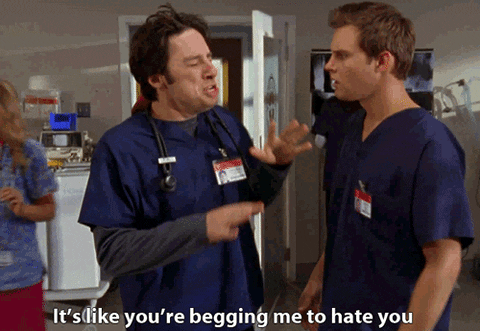
But oi, maybe I get it. Maybe you were writing for some whiny-ass professor/boss who gave you a nasty word count, or maybe editorial draconian policies by the journal forced you to do this. Boh. I don’t know. Don’t wanna antagonize her but reading you kids was a tour de force.
BUT LET US NOT GET DISTRACTED LIKE WE DO ALL THE FUCKING TIME
Bolter and Grusin’s article does something quite simple: it attempts to set theoretical lineaments to the three concepts of immediacy, hypermediacy, and remediation. Very cool.
The ‘core’ of the whole essay is something pretty much like this:
Our [sick-ass neurotic] Western culture is fixated on both immediacy and hypermediation. To achieve the first, we [very reasonably and not at all pervertedly] paradoxycally construct hypermediated environments. But we do also the reverse [again great reasoning abilities here]: in going all-in for hypermediacy we tend to rely on seemingly immediate devices. All this media push-and-pull is fucking bipolar implies a logic of remediation, in which the emergence of every new media generates reciprocal ‘borrowings’ and incorporations between the new and the old.
Now Bolter. Grusin.
DOES MY PARAGRAPH LOOK THIRTY FUCKING PAGES LONG?
B & G: No
GOOD. THEN WHY THE HELL YOURS DOES?

Fucking academics, man. They drive me crazy.
So the point is that this logic of remediation is based upon the mutual dependence of contradictiory determinations (the fact that immediacy depends on hypermediacy). And well, what is it if not another episode of my highly acclaimed sit-com series
“What famous philosopher is featured in this paper?”
Our guest star today is a boy you’ve already seen in this post.

Oh yeah baby, keep those antithetical determinations struggling with each other!
And so yeah, “Immediacy depends upon hypermediacy,” and very much like an original synthesis that transcends thesis and antithesis,
“the desire for immediacy leads to a process of appropriation and critique by which digital media reshape or ‘remediate’ one another and their analog predecessors” (314).
From this point, B. & G. write words upon words to disscuss the concepts of immediacy and hypermediacy, constructing what they define a “genealogy” of the two concepts. But they means this in a very specific way. Is another guest star of “What famous philosopher is featured in this paper” coming to join us?
OF COURSE
but surprises don’t end here, because
IT’S A RETURN!

Oh yeah, your favorite bald philosophical sex symbol is back to tell you that by saying “genealogy” he means
“an examination of descent” which “permits the discovery, under the unique aspect of a trait or a concept, of the myriad events through which—thanks to which, against which—they were formed” (qtd. in 315).
Therefore Bolter and Grusin investigate the way in which these two concepts have been shaped by cultural discourse over history. Which is all fun and leisure, but not really that important to us.
One thing I did want to talk about tho is the political aspect of immediacy. So let me get this straight. When discussing VR, B&G write:
“All these enthusiasts promise us perceptual immediacy, experience without mediation. They expect virtual reality to diminish and ultimately to deny the mediating presence of the computer and its interface” (317).
Now, you have been blessed enough to encounter some Marxism in your life, you might be reminded of the crucial concept of ideology. An ideology is a set of beliefs shared by members of a society – or imposed upon them – that naturalizes artificial relationships and norms inside that community. The thing about ideologies, though, is that they are not immediately visible. They are, to borrow from B&G, transparent, because they are designed to be invisible and to provide a sense of immediacy in social dialectic. Moreover, the stronger an ideology is – the more rooted it is in culture – the less visible it is. We could say, for instance, that Mark Fisher’s concept of Capitalist Realism works as a very transparent ideology.
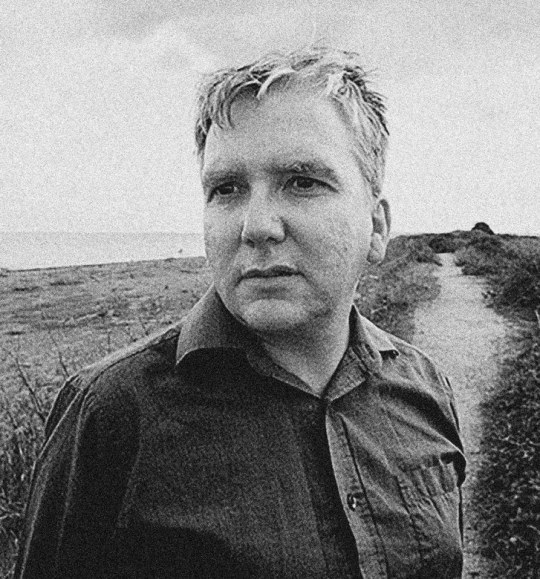
Rest in peace, comrade.
But going even deeper, it seems to me that this whole transparency thing is very totalitarian. Like VR is kind of totalitarian, because it seeks complete and utter control over your body and senses. Totalitarianism is like a transparent interface. It is a form of cultural VR. Or rather, ideology is a form of virtual reality.

And, oi, B&G make it clear enough that this works also when individuals have personal freedom. Sure, they’re talking about digital media, but still look at what they write:
“For if immediacy is promoted by removing the programmer/creator from the image, immediacy can also be promoted by involving the viewer more intimately in the image” (324).
That’s DEEP bruh.
Now let’s move on. So immediacy is essentially the dominant regime for much of the history of Western culture. Or at least ever since the Renaissance. It is the dream of being able to produce objects that trick us into believing that what we see is real. Fine.
Hypermediacy is sort of like its nemesis. It is the cultural regime of fragmentation, indeterminacy, multiplicity, heterogeneity and pretty much also of deliberate and explicit artificiality.
IT’S VERY POSTMODERN
VERY META-
It’s culture that is aware of its mediated nature, and breaks that suspension of disbelief stuff that makes you care for characters created by someone else.
youtube
See this at work in one of the greatest moments of digital media history.
Bolt ’n’ Grus have a lot of superfluous stuff to say about it, but unfortunately for them I am very postmodern too and my attention spans are short and so I’ll jump to remediation.
Remediation is B&S’s killer application. All their money is on this nice idea. The idea is that one of the defining characteristic of contemporary digital media – or rather, a phenomenon sparked by the emergence of them – is the fact that media represents other media in them. This, they say, can happen in four different modes.
1. Transparency: digital media highlights and re-presents an older media without any trace of irony or critique. This is like when you go search for that old album you really like on Apple Music. The platform does not ‘comment on’ the music. It just allows you to experience it by reproducing the older vynil/CD medium.

2. Emphasis on difference: digital media underlines and renders particularly evident the difference between itself and older media. Kinda like an improvement of older media through digital tools. This encompasses all the ‘expanded’ stuff you can get. Like library guides on our our library’s website. They are text-based like a physical library guide would, but they also have nice little video tutorials which improve them. Through the digital.
3. Refashoning: an ‘aggressive’ form of remediation that tries to refashion older media entirely while still signaling its presence and therefore retaining a sense of multiplicity. Here artificiality is explicit and discontinuity is visible. It is kind of like a new media collage. Something like this, perhaps:
youtube
4. Absorption and incorporation: the fourth and final mode is one in which discontinuity is minimized, because a media has entirely absorbed one or more characteristics of another one. Thus, we sort of come full circle, in the sense that absorption is superficially quite similar to transparency. Note that absorption works in both directions. Therefore you have it both in film through CGI and in videogames through cinematic cutscenes.
Our reading for this article ended with Bolter and Grusin saying that at the present moment (which for them is 1996, but non importa) all mediation is remediation, in the sense that “each medium or constellation of media […] responds to, redeploys, competes with, and reforms other media” (345). Which is also a way to offer a new connotation to the concept of media environment.
Now, sadly
WE ARE DONE.
It’s been a hell of a ride. I mean a hell. But also a ride. So we’re kind of even. It is time for me to bid you farewell; remind you to have protected sex always; assure you that, no, you won’t have panick attacks for the rest of your life (it’s the oppressive and ultra-competitive educational system’s fault); and re-assure you that, eventually, the dialectic of history will complete its cycle, unveil the inherent contradictions of capitalist societies, and prepare for the advent of a millenary communist civilization.

This come from Amazon, lol
Everything will turn out well. We will be fine. One day Donald Trump, Matteo Salvini, Boris Johnson, Marine Le Pen, Vladimir Putin, and Jair Bolsonaro will all rot in hell. We will probably have to deal with the catastrophic consequences of climate change brought about by capitalism but we’ll come out of this with a stronger, more inclusive, and more just society. Our dreams will come true and we’ll all become badass human beings who will be pillars of a reformed, humane society.
Enjoy the ride!
Today’s culture is a celebration of our struggles to become great and revolutionary individuals. Enjoy that too.
Coldplay - Lost!
youtube
William Blake, The Angel of Revelation (1805)

Adieu!
Image Sources: GIPHY, metmuseum.org, thenewpolis.com, micciacorta.it, amazon.com
1 note
·
View note
Text
Run Away - Chapter 15

Characters: OC/Oh Sehun/Exo
Genre: Romance, Angst, Fluff
Summary: An aspiring western model and a tired of stardom kpop star find their ways clashing in Seoul.
PART 1
PART 14
On Monday morning, just on time for her shift, but looking a lot more stressed out than usual, MinSeo stormed into the shop. She ran up to my spot and grabbing me by the elbow, she dragged me into the kitchen.
“Have you seen these?”
She pulled a couple magazines out of her bag and placed them on the counter top. Taking a look at the covers I immediately spotted pictures of Sehun wearing the same clothing he did on our trip, with a expression on his face that varied from surprised to annoyed from one photo to the other.
“He’s been all over social media too. People are wondering the reason behind your mysterious trip.” I stared at her blankly. “But don’t worry, because I haven’t found a single reference to you. At least, direct reference.”
She opened one of the magazines and searched through the pages until she found an specific article.
“But look at this.”
The first thing on sight was a photo of Sehun looking away from the camera, and right next to it, there was a close up of said picture focused on his neck. His very bruised neck. Bruised in a shape and placed in a way it was clear that wasn’t a bruise, but a hickey. The one I gave to him. The magazine had highlighted it enough, as the close up was surrounded by capitalized Korean words such as “scandalous” and pertinent emojis as a reaction to it.
I looked at MinSeo out of the corner of my eye.
“Do you know what the article says?” she asked.
“I can understand a few words…”
She turned to the next page.
“This is goes into scary details to talk about every single dating rumour that he’s had since debut era.”
“Are these girls he dated?” I asked, looking attentively at the pictures.
“I don’t know if he dated them or not, those are just rumours and you would have to ask yourself. But that’s not the point. They’re trying to find out who gave him the love bite.” She explained. “What happened?”
“I don’t know. We were at the beach and the town looked pretty calm. But the paparazzi appeared the next morning. I don’t know how they knew, but they did.”
“I don’t think they saw you, there would be pictures of you everywhere if that was the case…”
“Sehun was able to sneak me out of the hotel room without anyone seeing us, I hope.”
“You two were staying on the same room!?”
“Yeah…I mean, we’re kind of together. I think. I was the one to give him that hickey, not one of those girls…”
“No shit, Captain Obvious.”
Her snarky tone surprised me.
“Weren’t you the one who told me it would be okay if I wanted to kiss him in the first date and who went around making all types of dirty jokes?”
“Yes, but I never meant it! I thought you would be more discreet and that he would’ve known better than to let all of this out.”
“Could’ve been worse…” I whispered to myself.
“What was that? What do you mean?”
“Hmm…” I hesitated, but her raised eyebrow and her crossed arms over her chest reminded too much of how my mother looked when I had done something out of place. “We may had been swimming on the sea on Saturday evening.”
“So what?”
“Swimming in our underwear.”
She gasped loudly and covered her face with her hands. Then, she picked up the magazines and put them between my hands forcefully. She pushed me out of the kitchen, came back in and closed the door behind her. I could hear her grumbling the whole time.
**************
We fucked up
Yep
I’m sorry
It’s not your fault. At least not completely.
Can we meet?
I don’t think that’s the best idea right now
Please? I just want to talk
Hmm…Okay. Go to my apartment before 6 pm today and wait inside the building until I get there. I will call the doorman so he lets you in.
***************
Once my shift was over, I got inside the kitchen again to leave my apron. MinSeo signalled for me to wait until one of our co-workers, who was also looking for utensils inside, left.
“Are you seeing him now?” She asked, as she leaned back over the counter wiping her hands with a cloth.
I nodded as a response.
“Listen, Grace. I’m sorry if I was too harsh on you before. I just want you to be okay, both of you, but firstly you, because you’re my friend. Up until now everything has been okay with you two so you’re starting to be careless.” She sighed and I said nothing to cover up for her silence. “I don’t really have any advice to give you. I don’t know what I’d do if I were you. Just promise you’ll try to be careful.”
“I will.” I came close to her and hugged her tightly. “And you don’t need to apologize for anything. Friends should be there to smack sense into their friends heads when they need it, right?”
**********
It was 6:45 pm and I had already been waiting for an hour. After inspecting every corner of the building I was able to and looking through every single entertainment website I knew of in my phone, I went up to the apartment’s floor and sat down in the corridor, in front of his door. I took out the magazines from my bag and flicked through quickly through the pages until I got to the only articles I actually cared about. From what I was able to make out of the text, all the girls suspected to be “his new fling” were also kpop starts and celebrities.
“You know there’s a couple armchairs in the ground floor?” Sehun’s voice startled me, I hadn’t heard him coming. “There’s no need for you to be sitting there.”
I shrugged it off.
“I was there for a while, but got bored after the first twenty minutes.”
He extended his arm towards me and I took his hand to help myself get up from the floor.
“I’m sorry, we had a meeting today and it took longer than I expected.” He tried to take a look at the magazines over my shoulder. “What are you reading?”
“Oh, nothing. Just a dumb magazine. Picking up vocabulary, you know…” He nodded and looked at me in silence. “Aren’t you going to invite me in?”
“Yes, sure.” He quickly opened the door and led me in. “Do you want anything to drink?”
“No, I’m fine like this.”
We sat in the sofa, but the atmosphere wasn’t as comfortable as any of the other times we had been alone.
“You said you wanted to talk…?”
“What is going to happen?” I mumbled.
“About what?”
“Sehun, please. Don’t play dumb. Even MinSeo has been freaking out and she’s not even directly involved. What are we going to do?”
“I don’t think there’s a lot we can do. Just try to be as discreet as possible and let time go by so this all settles.”
His apparent tranquillity contrasted starkly with the mood I was in since MinSeo told me off that morning.
“What are we?”
“We? We are…friends?” He decided to change his wording when he saw the expression in my face. “Good friends?”
“I don’t think good friends act like couples. Or go on unplanned trips together. Or do what we did the other day.”
“It was you the one who started it.” Once again, my face did the talking. “What do you want me to answer, Grace? You know how things are, I’ve told you about it!”
“I just want you to tell me the truth. To finally set things down. You can lie about this to anyone you want, but do you have to lie to me too?”
He combed his hair back with his hands and sunk back into the sofa.
“I can’t.”
I got the magazine out of my bag and opened it in the pertinent page.
“Who are these?” I asked as I placed the magazine in top of the table.
“They’re friends,” he answered after taking a quick look through the pages.
“Friends just like I am?”
Sehun looked at me with wide open eyes, without knowing what to answer.
“Here it says that the one you’ve been more recently linked to is Irene and that she’s probably the one to blame for the state of your neck.”
“Your Korean has really advanced…” He tried to joke but I was having none of it.
“That’s not the point right now. Why is it ok that these girls are linked to you but not me? Is it because they’re all beautiful and famous and I’m not? Is it a "good” kind of publicity?“
"I got told off for that stuff!” His tone led me to believe he was getting mad. “Wait. Are you jealous?”
If stares worked as weapons, he would probably have been dead by that time.
“Do you still see them?”
“What? Yes, you are jealous!”
“Sehun, can you answer the question already? It’s not that hard!”
“I just see them if we happen to meet at an event, program or something like that. But why?”
“Why what?”
“Why are you jealous?”
“I’m not jealous, oh my god!”
I stood up quickly and walked up to the window. I could feel his eyes fixed on my back and I was glad he wasn’t able to see the blush that had crept to my face.
“I came here trying to be reasonable. I just don’t know what to do. I’m sick of hiding.”
“Neither do I,” he whispered.
We stayed in that position for some good ten minutes, in complete silence and lost in our own thoughts. Then, he stood up as well and approached me from behind, to circle my waist with his arms and rest his chin on top of my head.
“Jongdae was once seeing this girl. He had known her for quite a long time, because she was working for the company. I think she was some kind of assistant, but I don’t really remember. He actually had high hopes for the relationship, but somehow, people found out. Long story short, they lost their relationship and she also lost her job.”
“That’s unfortunate and I’m sorry for both,” I said as I leaned back into his body. “But it doesn’t need to be the case with us.”
“I’ve always thought it’s better to be safe than sorry.”
I turned around to look at him.
“What is that supposed to mean?”
“I think we should stop seeing each other. Until the promotion is over, at least.” He was looking at the floor as the words came out of his mouth.
“Are you breaking up with me?”
“In order to break up, there has to be something to start with,” he had a bitter half smile on his face. “But no, I am not. I intend to keep in touch with you. I just think we should stop for a while until the hardest part of the promotion is over and the press has more relevant things to focus on. That’s all.”
“I see. Then there’s not much else I can do here, right?” I stepped back, grabbed my things from where I’d left them and fished something out of my bag. “Take this. I thought you may not have concealer here. Maybe it fits your tone and you can use it to cover up the marks in your neck.” I tiptoed to kiss him on the cheek. “Bye, Sehun. Call me when you have the chance.”
My manager just drove past the café and I saw you through the windows.
Did you?
Yes. You were cleaning a table.
I see…
I never told you, but you look good in that short skirt
Ugh…
You were on the TV this afternoon
That’s not super unusual
You were performing one of the songs I watched when I went to the rehearsal
That’s what we were there for. Did you like it?
Yeah, it felt more complete, with the outfits and stuff. I liked the makeup, it looked like you had got you ass beaten.
I don’t know what to think about that.
It looked hot, just thank me for the compliment and roll with it
I just remembered something.
What thing?
Did your grandparents find out about our photoshoot?
I don’t think so, thank God. If they did, they haven’t told me and I’d rather stay in ignorance.
Why?
Yeah, why. I guess as you’re used to doing all those hip thrusts on national TV you have no shame anymore, right?
You’re strangely apprehensive about your own body to want to be a model so hard…
I’m not the same person in front of a camera and behind. Maybe you should try to find your own persona when you’re not working as well.
I’m sorry
What for?
I was unnecessarily cold to you the other day. I don’t know how to handle us.
I’m sorry too.
Why would you be?
I was actually jealous and didn’t want to admit it. I’ve never even been “out there” but I already feel like I’m being scrutinized and compared to people that are better than me.
They’re not better than you.
I miss you
…?
I just miss you. Miss your smiling face and your corny jokes and dropping by the café just to see you.
I don’t know what to say.
Don’t you miss me too?
I see you almost every day on TV and MinSeo keeps me updated in what’s going on, so I know about you.
Yeah…
Also, I don’t know how much of “a thing” we actually are. I’m not sure of what I’m allowed to feel.
I’m sorry about that.
Have you been sleeping and eating well lately?
Yeah, just like every day. Why?
Nothing. Just checking
I never got to find out if you were going to bring me a sweet or savoury breakfast
Oh
Yes. Not that it matters, but I was curious.
I was going to pick a bit of everything, to be honest. And a chocolate milkshake for me. I’m sure it wouldn’t have been as good as the ones you make, so that wasn’t much of a loss.
Flattery won’t get you anywhere, Oh.
Do you like kids?
When they’re full and tender, very tasty.
And when they’re alive and not available to eat?
Oh. They’re okay.
Okay? Wouldn’t you like to have them someday?
I would, but it’s not something I think about right now. I can barely support myself.
I would like to have a couple, maybe…
I’m so sick of this.
Yeah, me too.
What are you talking about?
I’m doing the washing up and this is the third time I drop a spoon. It’s getting annoying. What are *you* talking about?
The promotion. Twice a year or even more often. The same things done in the same places. The same people asking the same questions and getting the same answers.
Sounds kind of boring.
The only things that change are the songs and the choreographies. But I’m lucky to have my friends with me…
Chanyeol asked me about you today.
Yeah? What did he say?
Just wondering how you are and why I don’t mention you as much as I did before.
You used to talk about me?
Yeah.
And now you don’t anymore?
I try to avoid it.
Why?
I don’t know what would happen if one of my managers heard me talking about you in that way.
In which way?
In the way that you’re mine. And I’m yours. But also theirs.
You confuse me so much.
What is your favourite colour?
I don’t want to be discriminatory against poor little colours. They’re all colourful and deserve the same amount of attention.
That was the most useful question I could’ve asked.
When are you officially done with the promotion?
Just one more week. Why?
You always complain so much. I was just curious to know when the suffering ends.
I see. I actually wanted to tell you about it.
How’s that?
When the promotion ends the company usually arranges some big party in a disco. They invite other famous people they’re interested in keeping relationships with, possible investors, press, etc. But we all that’s over, we organize another party in the house we used to share in the beginning. It’s more private and we get to invite whoever we want. Usually that’s close friends, siblings, etc. We stay there for as long as we want, watch films, order food, play games, sing karaoke and all that stuff people do at parties. Would you like to come?
That actually sounds good. But I don’t really know if I should.
Why?
I don’t know what’s up with us. Would I be attending as a close friend? Because I’m pretty sure I’m not your sister…
Maybe we should talk about that some other time…
Sure
I wasn’t expecting this.
What thing?
The flowers you sent to my place of work.
Did your boss get mad?
No, he was actually gushing all over me trying to find out something about the “secret admirer”.
Did you like them?
Everybody likes flowers.
Unless they’re allergic.
But I’m not. Is this what you wanted to know my favourite colour for?
Maybe…
Why white?
I like white and you were wearing white when we first met. It was your uniform, but I think you look beautiful in white.
I see… These are outrageous, I can barely fit the whole bucket on the biggest cup I have at home.
I think you’d be better using a vase.
That’s too fancy for me.
I’ll get you one. Did you read the letter?
Yes.
What do you think about it?
It seems you can handle better the written words than an actual conversation.
…
I liked it and I appreciate the gesture. But I also think those are things you’d be better off saying them out loud when you’re physically next to me.
Of course, three days later, when MinSeo dropped me at my apartment building, he was the last person I had imagined I’d see sitting by the door. He got up quickly to dust off the back of his trousers and then bent down again to grab a package from the floor.
“I thought you were still in promotion time.”
“I am,” he answered. “But I needed to see you.”
I nodded and pushed him inside the apartment; there was no point in talking about this in the middle of the street.
“I brought you this,” he said handing me the package.
I teared the wrapping and opened the box to find a nice blue crystal vase.
“I thought blue would look pretty with the white flowers, if you’ve managed to keep them alive for these three days.”
“I really like it, thank you.”
I walked to the kitchen to fill it with water and started arranging the flowers inside it. Meanwhile, Sehun followed me over the whole apartment without saying another word.
“Didn’t you have some program to film today?”
“We were at the radio today. But it’s 8 pm, we also need to sleep…”
“I see…” I turned around to face him and leaned back over the counter top. “So, what brought you here?”
“I told you, I needed to see you.”
“What for?”
“You wanted me to say what I wrote out loud.”
“That’d be nice, yeah…”
My arms were crossed over my chest in what I thought that looked like a defensive gesture, but it didn’t work with him, as he approached me, put both his arms over my shoulders and started drawing patterns down my bare arms with his long fingers. He cleared his throat.
“Grace, I’m sorry for everything that happened the other day. I could blame it all on my job, but that wouldn’t be completely true. While my job doesn’t give us any room to grow, the truth is it was mostly my fault. This is the first time I ever feel this way in my whole life. I’m 22, but that doesn’t make me anymore experienced in this topic than if I were 15. I still don’t know how to handle this, but I’ve had my time to think and now I know I’m afraid. I scared of what may happen if the company finds out, if you become a public personality because of your relationship with me. I’m scared of other people’s reaction. I’m also scared of what may happen if either of us wants more space while the other is still attached. I’m wary of changes and believe or not, you’ve been the biggest change that’s happened to me in the last two years.
But I’ve also come to the knowledge that I need you around. I love your eyes and the sound of your laughter. I like your shiny hair and the way you’re sometimes so soft-spoken. You don’t couldn’t care less about the character I play towards the public, but at the same time, you manage to be encouraging. I still don’t know you completely and you don’t know me either, but I feel that’s already enough.
The time we spent at the beach was the most relaxed I’ve felt in months. You make me feel giddy and at ease with myself. I look forward to the time I can drop by the café to see your beautiful face, or that when we can meet again, or when I grab my phone to find a message of yours. I apologize again and ask you not to take those privileges from me.
I love you very much. Saranghaeyo. I’d love to be able to express in more languages what I feel about you, but to be honest, those are the only two I can speak.”
His eyes, which had been fixed on the piece of floor between our feet, travelled up to scan my face.
“I can believe you memorized the whole letter.”
He sighed.
“I needed to write it many times before the words were the appropriate, it wasn’t that hard to learn.” I nodded and he grabbed my hands. “To be honest, your reaction to the flowers wasn’t what I was expecting. I’m not sure what I wanted though, but I guess you’re hard to impress. Also, what you said had me thinking and I wanted to do things the right way.”
“I really liked the flowers.”
He smiled widely at that before speaking again.
“I’m very sorry that I have to keep you hidden as if you were an embarrassing secret. I know it’s not fair.”
“You don’t need to apologize anymore,” I answered shaking my head. “I know it’s hard for you and I will try to be more understanding from now on. Just promise me you won’t do it again. Don’t raise up all my hopes to suddenly take them all away. I trust you. Try to trust me as well.”
“I will.”
I stepped closer to him to press myself against his chest as I circled his waist with my arms, trying to make contact with as much of his skin as it was possible.
“I love you too.”
//
PART 1
PART 14
PART 16
MASTERLIST!?
#exo#exo fanfiction#exo fanfic#exo fan fiction#exo scenario#exo imagines#exo preference#exo smut#exo angst#exo romance#exo fluff#exo sehun#oh sehun#sehun fanfiction#sehun fanfic#sehun fan fiction#sehun scenario#sehun imagine#sehun smut#sehun angst#sehun romance#sehun fluff#mywriting#serie: run away
11 notes
·
View notes
Note
THUNDERBI FIV
T - Do you have any hard and fast headcanons that you will die defending?
Aro/Ace John is a hill I will die on.
H - What is your favorite source text for fandom stuff (e.g., TV shows, movies, books, anime, Western animation, etc.)?
Mm! I tend to prefer non-live action media as far as making fanworks. It always feels a little weird to write real people, and generally speaking I do not do that.
U - Three favorite characters from three different fandoms, and why they’re your favorites.
Thunderbirds are Go! - Gotta be John.
TF2 - Miss Pauling is my beautiful darkling murder daughter.
Endeavour - Endeavour Morse is my perfect and most tragic son and I will love him forever and always.
N - Name three things you wish you saw more or in your main fandom (or a fandom of choice).
HMM. I dunno, actually! I’m pretty happy with the state of things as they are. If I want more of anything in particular, I tend to make it (or make it happen) myself.
D - A pairing you wish you liked but just can’t.
JoBannon
E - Have you added anything cracky/hilarious to your fandom? If so, what?
Gordon’s One Thousand Word Lasagna Recipe, as told in narrative prose.
R - Which friendship/platonic relationship is your favorite in fandom?
I think i’m more or less responsible for kicking off John and Penny as a brotp, but I also really love Gordon and Kayo as besties.
B - A pairing–platonic, romantic or sexual–that you initially didn’t consider, but someone changed your mind.
If it’s an AU, I could be talked around to Scott/Kayo, but only in an AU. In the main canon, I don’t really ship Kayo with anybody. Other than that, I am a really big fan of Scott/Jane Carter. this is @space-baegel‘s fault
I - Has Tumblr caused you to stop liking any fandoms, if so, which and why?
TF2 got real gross in places. I tend to consider myself to be someone who creates FOR fandoms, rather than being an active member OF fandoms.
F - What’s the longest you’ve ever been in a fandom?
MMMMM I am secretly and quietly and always gonna be Absolute Trash for Power Rangers in Space, and I’ve loved that since it aired, though I wouldn’t say I’ve ever been a part of the power rangers fandom, it’s just a property I’ve always loved, as evidenced by the fact that I’ve rewritten it almost completely in my head.
V - Which character do you relate to most?
I’ve answered this previously, and this is just an answer I always come back to
HMM. I am an odd split between John and Gordon, I think. Personally and intellectually John, socially very much Gordon. I’ve actually answered this before, ages ago:
It’s gotta be John, it’s always been John, it was John from the very beginning. I identify with a preference for solitude, for separateness, for that aloof sort of seriousness that older siblings have, because they want to be taken seriously compared to their younger. I identify with the way he loves big problems with complicated solutions, loves cleverness and being challenged. I also love to tell people whose talents I admire and recognize exactly how I think they can best do their jobs. Also I am tall.
I also keep the company of a small, occasionally bratty individual with an annoying sense of humor. She lives where I live and occasionally attempts to kill me. I made her. She is always attempting to force me outside and trap me there against my will. Eventually, generally with a great deal of compromise on my part, we manage to reach an agreement.
But! I knew less about Gordon then than I do now, and I also identify a lot with Gordon. I’m also very gregarious in certain social circles, and when I do choose to engage with people, I’m excitable and I talk too much and I make too many jokes, entirely too often.
9 notes
·
View notes
Text
The Roots of Depression: How Much Does Modern Culture Have to Do With It?
I can’t complain about my existence in modern culture. My life is great. I have a loving family. My kids are happy and successful. My wife is a friend and lover and confidante and partner. Business is good and interesting. I care about what I’m doing. Every day is meaningful—and unburdened by concerns around mental well-being. Depression isn’t an issue for me.
But it’s not the case for everyone. The numbers don’t lie. Depression rates are climbing. Antidepressants are among the most common drug prescriptions, even among children. And because it can be embarrassing to admit you’re depressed—like there’s “something wrong” with you if you say as much—many people with depression never seek help, so the real numbers could be even higher. Depression isn’t new of course. The ancients knew it as “melancholia,” or possession by malevolent spirits. But all evidence suggests that depression is more prevalent than ever before.
What’s going on?
First of all, the way we speak about depression makes getting to the root of the issue harder.
“It’s all brain chemicals.”
“You have a neurotransmitter imbalance. There’s nothing you can do but take this pill.”
“You were born with it.”
This is an admirable attempt to de-stigmatize depression, turning it into a medical condition that “just happens” and “isn’t your fault.” Some people get brain tumors, some have type 1 diabetes, some have depression. There’s no shame in getting treatment for legitimate medical condition. This is an important development, but there’s a cost: It removes agency. If depression is just something you get or have from the outset, many (certainly not all) people believe there’s no reason to investigate the root cause or pursue alternative solutions.
While there’s definitely a genetic component to depression, and neurotransmitters play key roles, most depression requires some precipitating series of environmental inputs. The vast majority of babies with “depressive genes” don’t come out of the womb listless and morose with “bad brain chemicals.” They may be more or less susceptible to the environmental factors that can trigger depression later in life, but they still require those factors.
What’s happening? Clearly, something novel is afoot. Although we don’t have data on the mental health of paleolithic hunter-gatherers, extant hunter-gatherers exhibit an almost complete lack of depression.
What might help fill in one neglected dimension is to examine what’s unique about modern society.
It Is Atomized
People exist in their own bubbles. We sit in cars, in cubicles, in houses, in separate rooms. Even friends out to lunch are often seen gazing into their smartphones, half-ignorant of the normal waking reality occurring around them. Families gather in the living room not to play board games and chat about the day, but to access their personal portals into cyberspace. Together but apart. It may feel like we’re connecting, but we’re really just lonely. Like something out of a post-Sergeant Peppers Beatles dystopian concept album, the UK even just established a Ministry of Loneliness.
Loneliness has stronger associations with depression than any other social isolation indicator.
Lack Of Tribe
Robin Dunbar came up with Dunbar’s Number after studying disparate tribes and communities across the world: The maximum number of fulfilling, meaningful social relationships a person can reasonably maintain is about 150. We’re geared to desire social acceptance from our tribe, because social acceptance in a tribe of 150 people is both feasible and desirable. It increases survival. If “desire for social acceptance” is mediated by genes to at least some extent, it undergone positive selection; it was helpful and beneficial and supported species survival. Consider what the tribe originally meant: these are the people you grew up with, the people who will have your back. It’s important that your tribe accept you, and that you accept them. Things work better that way.
Today, our tribes are enormous and unwieldy. There’s the city. The state. The nation. The globe. Twitter. Our social media feeds. We can’t know everyone in our city, state, or Twitter feed, yet we get feedback from them. We see the best parts of their lives—what they show to the world—and compare them to the lowest parts of ours—what we hide from world but cannot escape internally. And then ironically, many of us feel estranged from or ignore the people who could actually comprise our true tribes—family, friends, loved ones, neighbors—even when they’re in the same room in favor of the larger, faker tribe. Yet the desire for social acceptance from this sprawling “tribe” persists. And it’s impossible to achieve for most people. Letting your tribe down hurts. We have tribes. They’re just not real or realistic.
Social media consumption predicts depressive symptoms.
It’s Devoid Of Higher Meaning
The roles of religion and other binding schools of philosophy and morality in society are waning. Most people can’t lean on the church or patriotism to find meaning or direction anymore. They must create their own, or discover it. That isn’t easy. It’s far simpler to ignore the void within, flip through your Netflix feed, and obsess about the latest superhero movie than it is to find your purpose.
Having a sense of life meaning is inversely associated with depression.
Life Is Easier
Most people (most reading this, anyway) aren’t walking three miles each way just for moderately fresh water that they still have to dose with iodine tabs or risk parasitic infection, slaving away their entire lives just to produce enough calories for their feudal lord and family, building their own homes out whatever they can manage and fixing whatever breaks (or not). They just turn the tap, order food from Thrive Market, call the plumber.
Work Is Increasingly “Information Work”
Rather than manipulate material objects in the world, we’re manipulating data, filling spreadsheets, fiddling with abstract numbers. Information work is no less real, but it doesn’t feel like that to our psyches.
Life Isn’t As Tragic
There are fewer “classic tragedies.” Fewer people lose loved ones to warfare, babies to disease. While we still have plenty of wars going on, they aren’t logging death counts like the World Wars or Genghis Khan’s conquests. Major civilian centers aren’t being leveled regularly by bombing raids. This is a positive development, but there’s a catch: Research shows that real life disasters strengthen bonds between friends, the neighbors, and the community. If we aren’t facing difficulties, we may not be living to our fullest potential.
Powerful Technology Is Widely Available Almost Everywhere
You can follow Maasai herders on Twitter. You can engage in live video chat with anyone in the world. No need to visit Grandma in Del Boca Vista; you can Facetime her!
Material Problems Are Disappearing
Most people get enough to eat, can get from here to there, can access the Internet, and get medical care if required. You have to try really hard in a modern Western society to die in the street. Even worldwide, poverty is falling. In 1981, nearly half the world’s population was “extremely poor.” As of 2016, it was under 10%. All that’s left are psychological problems.
Why am I here?
What’s the purpose of life?
Why should I continue working this job I don’t really like just to support the same boring routine?
This kind of rumination is a major factor in depression.
In Tribe, Sebastian Junger shows how veterans returning from war—on paper, a hellish experience no one would ever miss—feel suddenly lonely, lost, and often depressed back home. War compresses human experience and intensifies human bonding like nothing else. When these men and women leave war, they’re leaving the strongest, most cohesive tribe they’ve ever known. They’re leaving people who’d die for them and for whom they’d die. What, are they supposed to stand in line at Starbucks, staring at their phones like everyone else and think everything is just fine?
Why are potential root societal causes ignored?
For one, they’re huge problems. A pill is way easier than restructuring the fabric of modern society. If you did that, you’d have to get it right the first time. You can’t exactly run an RCT on social upheaval.
Two, we assume a shared environment. Most of the people you see walking around eat the same basic diet, do the same basic exercises (or don’t), and deal with the same societal pressures and conditions. If you look at things wrong, it seems immutable and unavoidable. Even if they’re aware on some level that modern living is involved in the etiology of depression, most clinicians are assuming, based on prior experience with patients and their own misconceptions about what’s possible and what’s not, that we just have to accept it and apply the best band-aids we have. But if you’ve approached diet and exercise from an evolutionary angle and had incredible results where nothing else had ever worked—you know that common is not normal. You know that the environmental inputs shared by so many in the industrialized world might be persistent and tempting and hard to avoid, but they are avoidable. You can change your surroundings, your inputs, even your mindset.
Three, it isn’t clear what the solutions even are. The world is better today in many ways. Just because many veterans find their tribe in war and suffer upon returning, it doesn’t follow that we should go to war more often for our mental health.
We can’t rely on technocratic overlords to engineer the perfect utopia. Those always end in dystopias—more Brave New World than 1984. No, any change has to start within each individual, at dinner tables, in friend circles, in one person—you—deciding to do things differently.
I won’t get much into diet or exercise or sunlight or sleep today. Those are major parts of the equation, but I prefer to focus on how the structure of our society impacts depression and how we can transcend it.
These are some ideas. They’re not perfect. They’re not the whole story. And they’re not meant to replace medication or therapy or anything like that. But they won’t hurt….
Listen to the “first voice.” Every time you get that little voice saying “I should finally pick up that book” or “I should walk the dog” or “I wonder what my friends are up to,” DO IT. Don’t let the other voice override you and say “Nah, let’s just stay inside today.” That second voice is destroying you. Do everything you can to ignore it.
In low moments, rather than try to cheer yourself up, be of service to someone. A concerted effort to cheer oneself up often produces the opposite effect. We’re not great at doing it for ourselves, perhaps because at some level we sense it’s all a sham, a ploy to shift around neurotransmitters. But when you help someone else, you’re truly helping them. They feel good, you feel good, and everyone wins.
Chase meaning, not happiness. “Being happy” is hard work. You can’t get there by trying. Figure out what you care about at the deepest level of your being. What stirs you. What, most importantly, you can actually affect with your skillset. If you can manage to imbue every fiber of your being with that purpose, you’ll get going after it. You’ll have something to do, and maybe you’ll have less time for rumination and other things that make your depression worse.
Easier said than done, you might say. Definitely. I haven’t been there myself, but I’ve helped people close to me who have. Clinical depression isn’t just sadness. It’s profoundly demotivating, where taking even the smallest act like getting dressed can be a struggle. Dopamine, the neurotransmitter involved in movement and achievement and motivation, tends to plummet in major depression.
Still, what else is there? You are an individual, not an atom. An atom is separate but unconscious. It has no agency. It simply is. An individual is separate from other individuals but conscious. It has agency. It can form communities, strong bonds. Revel in your personal sovereignty but don’t forget that you’re a social animal who will probably be much happier with a few good friends (who aren’t all wielding smartphones 24-7).
There are other specific things to try. Trawl the scientific literature and you’ll find hundreds of studies showing efficacy for any number of medication-free depression therapies and interventions. None of them are the final answer, though, as much as they can help. Ballroom dancing isn’t going to fix things. Gardening isn’t enough. Heavy squats won’t do it. Plunging into cold water isn’t everything.
It has to be a comprehensive shift.
The common theme running through most of these “alternative” interventions is that it places you square in the midst of cold hard reality. You’re on your knees, handling soil and planting vegetables. You’re dancing, immersed in the music and managing the dynamic interplay between you and your partner. You’re lifting something very heavy. You’re completely submerged in freezing water. These are real. They cannot be escaped or negotiated with. They aren’t running on perpetual loops inside your head. They’re actually happening.
Get as much of that in your life.
In the future, I’ll discuss this topic further. I’ll talk about dietary, exercise, lifestyle, supplement, and psychological modifications we can make.
For now, I’d love to hear from you. Those who’ve dealt with or who currently deal with depression, what’s helped? What hasn’t? What’s your take on the list of social factors that may explain the rise in depression—or the severity of symptoms as you experience them? What do you think we can do—as individuals and as a society—to make things better?
Thanks for reading. Take care.
The post The Roots of Depression: How Much Does Modern Culture Have to Do With It? appeared first on Mark's Daily Apple.
Article source here:Marks’s Daily Apple
0 notes
Text
The Roots of Depression: How Much Does Modern Culture Have to Do With It?
I can’t complain about my existence in modern culture. My life is great. I have a loving family. My kids are happy and successful. My wife is a friend and lover and confidante and partner. Business is good and interesting. I care about what I’m doing. Every day is meaningful—and unburdened by concerns around mental well-being. Depression isn’t an issue for me.
But it’s not the case for everyone. The numbers don’t lie. Depression rates are climbing. Antidepressants are among the most common drug prescriptions, even among children. And because it can be embarrassing to admit you’re depressed—like there’s “something wrong” with you if you say as much—many people with depression never seek help, so the real numbers could be even higher. Depression isn’t new of course. The ancients knew it as “melancholia,” or possession by malevolent spirits. But all evidence suggests that depression is more prevalent than ever before.
What’s going on?
First of all, the way we speak about depression makes getting to the root of the issue harder.
“It’s all brain chemicals.”
“You have a neurotransmitter imbalance. There’s nothing you can do but take this pill.”
“You were born with it.”
This is an admirable attempt to de-stigmatize depression, turning it into a medical condition that “just happens” and “isn’t your fault.” Some people get brain tumors, some have type 1 diabetes, some have depression. There’s no shame in getting treatment for legitimate medical condition. This is an important development, but there’s a cost: It removes agency. If depression is just something you get or have from the outset, many (certainly not all) people believe there’s no reason to investigate the root cause or pursue alternative solutions.
While there’s definitely a genetic component to depression, and neurotransmitters play key roles, most depression requires some precipitating series of environmental inputs. The vast majority of babies with “depressive genes” don’t come out of the womb listless and morose with “bad brain chemicals.” They may be more or less susceptible to the environmental factors that can trigger depression later in life, but they still require those factors.
What’s happening? Clearly, something novel is afoot. Although we don’t have data on the mental health of paleolithic hunter-gatherers, extant hunter-gatherers exhibit an almost complete lack of depression.
What might help fill in one neglected dimension is to examine what’s unique about modern society.
It Is Atomized
People exist in their own bubbles. We sit in cars, in cubicles, in houses, in separate rooms. Even friends out to lunch are often seen gazing into their smartphones, half-ignorant of the normal waking reality occurring around them. Families gather in the living room not to play board games and chat about the day, but to access their personal portals into cyberspace. Together but apart. It may feel like we’re connecting, but we’re really just lonely. Like something out of a post-Sergeant Peppers Beatles dystopian concept album, the UK even just established a Ministry of Loneliness.
Loneliness has stronger associations with depression than any other social isolation indicator.
Lack Of Tribe
Robin Dunbar came up with Dunbar’s Number after studying disparate tribes and communities across the world: The maximum number of fulfilling, meaningful social relationships a person can reasonably maintain is about 150. We’re geared to desire social acceptance from our tribe, because social acceptance in a tribe of 150 people is both feasible and desirable. It increases survival. If “desire for social acceptance” is mediated by genes to at least some extent, it undergone positive selection; it was helpful and beneficial and supported species survival. Consider what the tribe originally meant: these are the people you grew up with, the people who will have your back. It’s important that your tribe accept you, and that you accept them. Things work better that way.
Today, our tribes are enormous and unwieldy. There’s the city. The state. The nation. The globe. Twitter. Our social media feeds. We can’t know everyone in our city, state, or Twitter feed, yet we get feedback from them. We see the best parts of their lives—what they show to the world—and compare them to the lowest parts of ours—what we hide from world but cannot escape internally. And then ironically, many of us feel estranged from or ignore the people who could actually comprise our true tribes—family, friends, loved ones, neighbors—even when they’re in the same room in favor of the larger, faker tribe. Yet the desire for social acceptance from this sprawling “tribe” persists. And it’s impossible to achieve for most people. Letting your tribe down hurts. We have tribes. They’re just not real or realistic.
Social media consumption predicts depressive symptoms.
It’s Devoid Of Higher Meaning
The roles of religion and other binding schools of philosophy and morality in society are waning. Most people can’t lean on the church or patriotism to find meaning or direction anymore. They must create their own, or discover it. That isn’t easy. It’s far simpler to ignore the void within, flip through your Netflix feed, and obsess about the latest superhero movie than it is to find your purpose.
Having a sense of life meaning is inversely associated with depression.
Life Is Easier
Most people (most reading this, anyway) aren’t walking three miles each way just for moderately fresh water that they still have to dose with iodine tabs or risk parasitic infection, slaving away their entire lives just to produce enough calories for their feudal lord and family, building their own homes out whatever they can manage and fixing whatever breaks (or not). They just turn the tap, order food from Thrive Market, call the plumber.
Work Is Increasingly “Information Work”
Rather than manipulate material objects in the world, we’re manipulating data, filling spreadsheets, fiddling with abstract numbers. Information work is no less real, but it doesn’t feel like that to our psyches.
Life Isn’t As Tragic
There are fewer “classic tragedies.” Fewer people lose loved ones to warfare, babies to disease. While we still have plenty of wars going on, they aren’t logging death counts like the World Wars or Genghis Khan’s conquests. Major civilian centers aren’t being leveled regularly by bombing raids. This is a positive development, but there’s a catch: Research shows that real life disasters strengthen bonds between friends, the neighbors, and the community. If we aren’t facing difficulties, we may not be living to our fullest potential.
Powerful Technology Is Widely Available Almost Everywhere
You can follow Maasai herders on Twitter. You can engage in live video chat with anyone in the world. No need to visit Grandma in Del Boca Vista; you can Facetime her!
Material Problems Are Disappearing
Most people get enough to eat, can get from here to there, can access the Internet, and get medical care if required. You have to try really hard in a modern Western society to die in the street. Even worldwide, poverty is falling. In 1981, nearly half the world’s population was “extremely poor.” As of 2016, it was under 10%. All that’s left are psychological problems.
Why am I here?
What’s the purpose of life?
Why should I continue working this job I don’t really like just to support the same boring routine?
This kind of rumination is a major factor in depression.
In Tribe, Sebastian Junger shows how veterans returning from war—on paper, a hellish experience no one would ever miss—feel suddenly lonely, lost, and often depressed back home. War compresses human experience and intensifies human bonding like nothing else. When these men and women leave war, they’re leaving the strongest, most cohesive tribe they’ve ever known. They’re leaving people who’d die for them and for whom they’d die. What, are they supposed to stand in line at Starbucks, staring at their phones like everyone else and think everything is just fine?
Why are potential root societal causes ignored?
For one, they’re huge problems. A pill is way easier than restructuring the fabric of modern society. If you did that, you’d have to get it right the first time. You can’t exactly run an RCT on social upheaval.
Two, we assume a shared environment. Most of the people you see walking around eat the same basic diet, do the same basic exercises (or don’t), and deal with the same societal pressures and conditions. If you look at things wrong, it seems immutable and unavoidable. Even if they’re aware on some level that modern living is involved in the etiology of depression, most clinicians are assuming, based on prior experience with patients and their own misconceptions about what’s possible and what’s not, that we just have to accept it and apply the best band-aids we have. But if you’ve approached diet and exercise from an evolutionary angle and had incredible results where nothing else had ever worked—you know that common is not normal. You know that the environmental inputs shared by so many in the industrialized world might be persistent and tempting and hard to avoid, but they are avoidable. You can change your surroundings, your inputs, even your mindset.
Three, it isn’t clear what the solutions even are. The world is better today in many ways. Just because many veterans find their tribe in war and suffer upon returning, it doesn’t follow that we should go to war more often for our mental health.
We can’t rely on technocratic overlords to engineer the perfect utopia. Those always end in dystopias—more Brave New World than 1984. No, any change has to start within each individual, at dinner tables, in friend circles, in one person—you—deciding to do things differently.
I won’t get much into diet or exercise or sunlight or sleep today. Those are major parts of the equation, but I prefer to focus on how the structure of our society impacts depression and how we can transcend it.
These are some ideas. They’re not perfect. They’re not the whole story. And they’re not meant to replace medication or therapy or anything like that. But they won’t hurt….
Listen to the “first voice.” Every time you get that little voice saying “I should finally pick up that book” or “I should walk the dog” or “I wonder what my friends are up to,” DO IT. Don’t let the other voice override you and say “Nah, let’s just stay inside today.” That second voice is destroying you. Do everything you can to ignore it.
In low moments, rather than try to cheer yourself up, be of service to someone. A concerted effort to cheer oneself up often produces the opposite effect. We’re not great at doing it for ourselves, perhaps because at some level we sense it’s all a sham, a ploy to shift around neurotransmitters. But when you help someone else, you’re truly helping them. They feel good, you feel good, and everyone wins.
Chase meaning, not happiness. “Being happy” is hard work. You can’t get there by trying. Figure out what you care about at the deepest level of your being. What stirs you. What, most importantly, you can actually affect with your skillset. If you can manage to imbue every fiber of your being with that purpose, you’ll get going after it. You’ll have something to do, and maybe you’ll have less time for rumination and other things that make your depression worse.
Easier said than done, you might say. Definitely. I haven’t been there myself, but I’ve helped people close to me who have. Clinical depression isn’t just sadness. It’s profoundly demotivating, where taking even the smallest act like getting dressed can be a struggle. Dopamine, the neurotransmitter involved in movement and achievement and motivation, tends to plummet in major depression.
Still, what else is there? You are an individual, not an atom. An atom is separate but unconscious. It has no agency. It simply is. An individual is separate from other individuals but conscious. It has agency. It can form communities, strong bonds. Revel in your personal sovereignty but don’t forget that you’re a social animal who will probably be much happier with a few good friends (who aren’t all wielding smartphones 24-7).
There are other specific things to try. Trawl the scientific literature and you’ll find hundreds of studies showing efficacy for any number of medication-free depression therapies and interventions. None of them are the final answer, though, as much as they can help. Ballroom dancing isn’t going to fix things. Gardening isn’t enough. Heavy squats won’t do it. Plunging into cold water isn’t everything.
It has to be a comprehensive shift.
The common theme running through most of these “alternative” interventions is that it places you square in the midst of cold hard reality. You’re on your knees, handling soil and planting vegetables. You’re dancing, immersed in the music and managing the dynamic interplay between you and your partner. You’re lifting something very heavy. You’re completely submerged in freezing water. These are real. They cannot be escaped or negotiated with. They aren’t running on perpetual loops inside your head. They’re actually happening.
Get as much of that in your life.
In the future, I’ll discuss this topic further. I’ll talk about dietary, exercise, lifestyle, supplement, and psychological modifications we can make.
For now, I’d love to hear from you. Those who’ve dealt with or who currently deal with depression, what’s helped? What hasn’t? What’s your take on the list of social factors that may explain the rise in depression—or the severity of symptoms as you experience them? What do you think we can do—as individuals and as a society—to make things better?
Thanks for reading. Take care.
0 notes
Text
The Roots of Depression: How Much Does Modern Culture Have to Do With It?
I can’t complain about my existence in modern culture. My life is great. I have a loving family. My kids are happy and successful. My wife is a friend and lover and confidante and partner. Business is good and interesting. I care about what I’m doing. Every day is meaningful—and unburdened by concerns around mental well-being. Depression isn’t an issue for me.
But it’s not the case for everyone. The numbers don’t lie. Depression rates are climbing. Antidepressants are among the most common drug prescriptions, even among children. And because it can be embarrassing to admit you’re depressed—like there’s “something wrong” with you if you say as much—many people with depression never seek help, so the real numbers could be even higher. Depression isn’t new of course. The ancients knew it as “melancholia,” or possession by malevolent spirits. But all evidence suggests that depression is more prevalent than ever before.
What’s going on?
First of all, the way we speak about depression makes getting to the root of the issue harder.
“It’s all brain chemicals.”
“You have a neurotransmitter imbalance. There’s nothing you can do but take this pill.”
“You were born with it.”
This is an admirable attempt to de-stigmatize depression, turning it into a medical condition that “just happens” and “isn’t your fault.” Some people get brain tumors, some have type 1 diabetes, some have depression. There’s no shame in getting treatment for legitimate medical condition. This is an important development, but there’s a cost: It removes agency. If depression is just something you get or have from the outset, many (certainly not all) people believe there’s no reason to investigate the root cause or pursue alternative solutions.
While there’s definitely a genetic component to depression, and neurotransmitters play key roles, most depression requires some precipitating series of environmental inputs. The vast majority of babies with “depressive genes” don’t come out of the womb listless and morose with “bad brain chemicals.” They may be more or less susceptible to the environmental factors that can trigger depression later in life, but they still require those factors.
What’s happening? Clearly, something novel is afoot. Although we don’t have data on the mental health of paleolithic hunter-gatherers, extant hunter-gatherers exhibit an almost complete lack of depression.
What might help fill in one neglected dimension is to examine what’s unique about modern society.
It Is Atomized
People exist in their own bubbles. We sit in cars, in cubicles, in houses, in separate rooms. Even friends out to lunch are often seen gazing into their smartphones, half-ignorant of the normal waking reality occurring around them. Families gather in the living room not to play board games and chat about the day, but to access their personal portals into cyberspace. Together but apart. It may feel like we’re connecting, but we’re really just lonely. Like something out of a post-Sergeant Peppers Beatles dystopian concept album, the UK even just established a Ministry of Loneliness.
Loneliness has stronger associations with depression than any other social isolation indicator.
Lack Of Tribe
Robin Dunbar came up with Dunbar’s Number after studying disparate tribes and communities across the world: The maximum number of fulfilling, meaningful social relationships a person can reasonably maintain is about 150. We’re geared to desire social acceptance from our tribe, because social acceptance in a tribe of 150 people is both feasible and desirable. It increases survival. If “desire for social acceptance” is mediated by genes to at least some extent, it undergone positive selection; it was helpful and beneficial and supported species survival. Consider what the tribe originally meant: these are the people you grew up with, the people who will have your back. It’s important that your tribe accept you, and that you accept them. Things work better that way.
Today, our tribes are enormous and unwieldy. There’s the city. The state. The nation. The globe. Twitter. Our social media feeds. We can’t know everyone in our city, state, or Twitter feed, yet we get feedback from them. We see the best parts of their lives—what they show to the world—and compare them to the lowest parts of ours—what we hide from world but cannot escape internally. And then ironically, many of us feel estranged from or ignore the people who could actually comprise our true tribes—family, friends, loved ones, neighbors—even when they’re in the same room in favor of the larger, faker tribe. Yet the desire for social acceptance from this sprawling “tribe” persists. And it’s impossible to achieve for most people. Letting your tribe down hurts. We have tribes. They’re just not real or realistic.
Social media consumption predicts depressive symptoms.
It’s Devoid Of Higher Meaning
The roles of religion and other binding schools of philosophy and morality in society are waning. Most people can’t lean on the church or patriotism to find meaning or direction anymore. They must create their own, or discover it. That isn’t easy. It’s far simpler to ignore the void within, flip through your Netflix feed, and obsess about the latest superhero movie than it is to find your purpose.
Having a sense of life meaning is inversely associated with depression.
Life Is Easier
Most people (most reading this, anyway) aren’t walking three miles each way just for moderately fresh water that they still have to dose with iodine tabs or risk parasitic infection, slaving away their entire lives just to produce enough calories for their feudal lord and family, building their own homes out whatever they can manage and fixing whatever breaks (or not). They just turn the tap, order food from Thrive Market, call the plumber.
Work Is Increasingly “Information Work”
Rather than manipulate material objects in the world, we’re manipulating data, filling spreadsheets, fiddling with abstract numbers. Information work is no less real, but it doesn’t feel like that to our psyches.
Life Isn’t As Tragic
There are fewer “classic tragedies.” Fewer people lose loved ones to warfare, babies to disease. While we still have plenty of wars going on, they aren’t logging death counts like the World Wars or Genghis Khan’s conquests. Major civilian centers aren’t being leveled regularly by bombing raids. This is a positive development, but there’s a catch: Research shows that real life disasters strengthen bonds between friends, the neighbors, and the community. If we aren’t facing difficulties, we may not be living to our fullest potential.
Powerful Technology Is Widely Available Almost Everywhere
You can follow Maasai herders on Twitter. You can engage in live video chat with anyone in the world. No need to visit Grandma in Del Boca Vista; you can Facetime her!
Material Problems Are Disappearing
Most people get enough to eat, can get from here to there, can access the Internet, and get medical care if required. You have to try really hard in a modern Western society to die in the street. Even worldwide, poverty is falling. In 1981, nearly half the world’s population was “extremely poor.” As of 2016, it was under 10%. All that’s left are psychological problems.
Why am I here?
What’s the purpose of life?
Why should I continue working this job I don’t really like just to support the same boring routine?
This kind of rumination is a major factor in depression.
In Tribe, Sebastian Junger shows how veterans returning from war—on paper, a hellish experience no one would ever miss—feel suddenly lonely, lost, and often depressed back home. War compresses human experience and intensifies human bonding like nothing else. When these men and women leave war, they’re leaving the strongest, most cohesive tribe they’ve ever known. They’re leaving people who’d die for them and for whom they’d die. What, are they supposed to stand in line at Starbucks, staring at their phones like everyone else and think everything is just fine?
Why are potential root societal causes ignored?
For one, they’re huge problems. A pill is way easier than restructuring the fabric of modern society. If you did that, you’d have to get it right the first time. You can’t exactly run an RCT on social upheaval.
Two, we assume a shared environment. Most of the people you see walking around eat the same basic diet, do the same basic exercises (or don’t), and deal with the same societal pressures and conditions. If you look at things wrong, it seems immutable and unavoidable. Even if they’re aware on some level that modern living is involved in the etiology of depression, most clinicians are assuming, based on prior experience with patients and their own misconceptions about what’s possible and what’s not, that we just have to accept it and apply the best band-aids we have. But if you’ve approached diet and exercise from an evolutionary angle and had incredible results where nothing else had ever worked—you know that common is not normal. You know that the environmental inputs shared by so many in the industrialized world might be persistent and tempting and hard to avoid, but they are avoidable. You can change your surroundings, your inputs, even your mindset.
Three, it isn’t clear what the solutions even are. The world is better today in many ways. Just because many veterans find their tribe in war and suffer upon returning, it doesn’t follow that we should go to war more often for our mental health.
We can’t rely on technocratic overlords to engineer the perfect utopia. Those always end in dystopias—more Brave New World than 1984. No, any change has to start within each individual, at dinner tables, in friend circles, in one person—you—deciding to do things differently.
I won’t get much into diet or exercise or sunlight or sleep today. Those are major parts of the equation, but I prefer to focus on how the structure of our society impacts depression and how we can transcend it.
These are some ideas. They’re not perfect. They’re not the whole story. And they’re not meant to replace medication or therapy or anything like that. But they won’t hurt….
Listen to the “first voice.” Every time you get that little voice saying “I should finally pick up that book” or “I should walk the dog” or “I wonder what my friends are up to,” DO IT. Don’t let the other voice override you and say “Nah, let’s just stay inside today.” That second voice is destroying you. Do everything you can to ignore it.
In low moments, rather than try to cheer yourself up, be of service to someone. A concerted effort to cheer oneself up often produces the opposite effect. We’re not great at doing it for ourselves, perhaps because at some level we sense it’s all a sham, a ploy to shift around neurotransmitters. But when you help someone else, you’re truly helping them. They feel good, you feel good, and everyone wins.
Chase meaning, not happiness. “Being happy” is hard work. You can’t get there by trying. Figure out what you care about at the deepest level of your being. What stirs you. What, most importantly, you can actually affect with your skillset. If you can manage to imbue every fiber of your being with that purpose, you’ll get going after it. You’ll have something to do, and maybe you’ll have less time for rumination and other things that make your depression worse.
Easier said than done, you might say. Definitely. I haven’t been there myself, but I’ve helped people close to me who have. Clinical depression isn’t just sadness. It’s profoundly demotivating, where taking even the smallest act like getting dressed can be a struggle. Dopamine, the neurotransmitter involved in movement and achievement and motivation, tends to plummet in major depression.
Still, what else is there? You are an individual, not an atom. An atom is separate but unconscious. It has no agency. It simply is. An individual is separate from other individuals but conscious. It has agency. It can form communities, strong bonds. Revel in your personal sovereignty but don’t forget that you’re a social animal who will probably be much happier with a few good friends (who aren’t all wielding smartphones 24-7).
There are other specific things to try. Trawl the scientific literature and you’ll find hundreds of studies showing efficacy for any number of medication-free depression therapies and interventions. None of them are the final answer, though, as much as they can help. Ballroom dancing isn’t going to fix things. Gardening isn’t enough. Heavy squats won’t do it. Plunging into cold water isn’t everything.
It has to be a comprehensive shift.
The common theme running through most of these “alternative” interventions is that it places you square in the midst of cold hard reality. You’re on your knees, handling soil and planting vegetables. You’re dancing, immersed in the music and managing the dynamic interplay between you and your partner. You’re lifting something very heavy. You’re completely submerged in freezing water. These are real. They cannot be escaped or negotiated with. They aren’t running on perpetual loops inside your head. They’re actually happening.
Get as much of that in your life.
In the future, I’ll discuss this topic further. I’ll talk about dietary, exercise, lifestyle, supplement, and psychological modifications we can make.
For now, I’d love to hear from you. Those who’ve dealt with or who currently deal with depression, what’s helped? What hasn’t? What’s your take on the list of social factors that may explain the rise in depression—or the severity of symptoms as you experience them? What do you think we can do—as individuals and as a society—to make things better?
Thanks for reading. Take care.
0 notes
Text
untitled
I remember being a 14-year-old in the corner of my local public library after school reading Bell Hooks and Patricia Jung. Something clicked reading those pages, and although I didn't understand just yet everything I was absorbing, there were a lot of fundamental components about even my own anatomy and sexuality I found helpful—there in the second floor of a library. Not in a sex ed class. What I was told growing up was something entirely different, and because it didn't sit right to me I did my own research. The idea of virginity is meticulously and socially constructed. There is an entire culture around "purity". It is especially harmful for young teens. In the Western world we, from a young age are sipping a dangerous cocktail of stereotyping from the media and "abstinence only" heteronormative sex education, which is not based on science and has had no impact on whether or not teens actually abstain from sex. So not only are they still having sex, but they are doing it with little, to no accurate information and in many cases, protection. This virginity movement has some how made its way full circle: using new tactics, specifically political to corner us into choosing one of two options—stay abstinent or suffer the consequences. Not to mention the exclusion of queer, asexual and transgender folk.This movement has been threatened over and over again by a lack of submission in the setting of gender roles, leading republican politicians to sign health bills and shut down necessary, safe spaces for us to get reproductive information as well as safe procedures and contraception. The media doesn't stay far behind—Encouraging/romanticizing slut-shaming and a double-standard that continues to pressure young girls into dangerous situations in which they have no fault of but continue to get blamed for. We may not see it, but upholding this shameful and dangerous movement tells young people, specifically young girls that their importance does not lie within their minds but between their legs.
Monica Grajeda, 2017
0 notes